ANNUAL REPORT 2022




It is my pleasure to present to you the Swiss TPH Annual Report 2022 and I wish you a good read.

I am filled with deep gratitude for all that we and our partners have accomplished over the past 12 months. With the move to our new headquarters in Allschwil, we successfully completed the largest project Swiss TPH was ever involved in. Here we are as an anchor institute in an emerging and bustling life science and biotech cluster. Our open working environment and modern laboratories start to bear fruit, as we work more collaboratively, break disciplinary silos and pursue even more partnership opportunities.
At Swiss TPH, we are driven by our passion to make a meaningful and measurable impact on the health of people locally, nationally and internationally. Hence, this past year, we continued to tackle some of the most pressing global
health challenges to advance the health of people and improve their lives around the world.
Our staff, students and partners worked tirelessly on more than 350 projects in around 120 countries. Activities ranged from basic research to deepen the understanding of the mechanism of action and resistance patterns in bacteria, parasites and viruses, to assessing the accuracy of new diagnostics and determining the efficacy and safety of drugs and vaccines. We also worked on the implementation of interventions and strengthened health systems worldwide. The impact of Swiss TPH is also reflected in informing and guiding policy changes based on new evidence generated by our research and long-term cohort studies and biobanks. You can read more about how science guides new policy, and thus, improves people’s health and well-being in the Insights section on pages 24 – 30.
The COVID-19 pandemic has clearly demonstrated how interconnected our world is. Partnerships built on mutual trust, interdisciplinary approaches and strong global networks are key to identifying and responding to current and future health emergencies. Swiss TPH is committed to intensifying its efforts to address existing and emerging health threats, including climate change. At the heart of our mission is also the pursuit of more equitable health systems which benefit everyone. We are currently working on our new 4-year strategy (2025 – 2028) that will place even greater emphasis on these issues and guide our work in the coming years.
“We strive to make a meaningful and measurable impact on people’s health”
2022 has also seen a change in our Board of Governors: Eva Herzog, Member of the Swiss Council of States of the Canton of Basel-Stadt, has been elected by both Basel-Landschaft and Basel-Stadt as the new President, succeeding Andreas Burckhardt. I would like to wholeheartedly thank Andreas for his commitment and support over the past seven years while he served as President and warmly welcome Eva to her new role. Her experience and leadership will be a valuable asset to our institute and I look forward to introduce her to key partners and institutions in Tanzania later this year, after the successful visit to Côte d’Ivoire in January 2023. You can read more about our President’s vision for Swiss TPH in Future Perspectives on pages 6 – 8.
I would like to express my deep gratitude to our talented and intrinsically motivated staff, students and partners around the world. None of our achievements would be possible without their courage, integrity, passion and respect. We look forward to continuing our work with all of you, as we strive to improve the health and well-being of people around the world.
Prof. Dr. Jürg Utzinger Director, Swiss TPH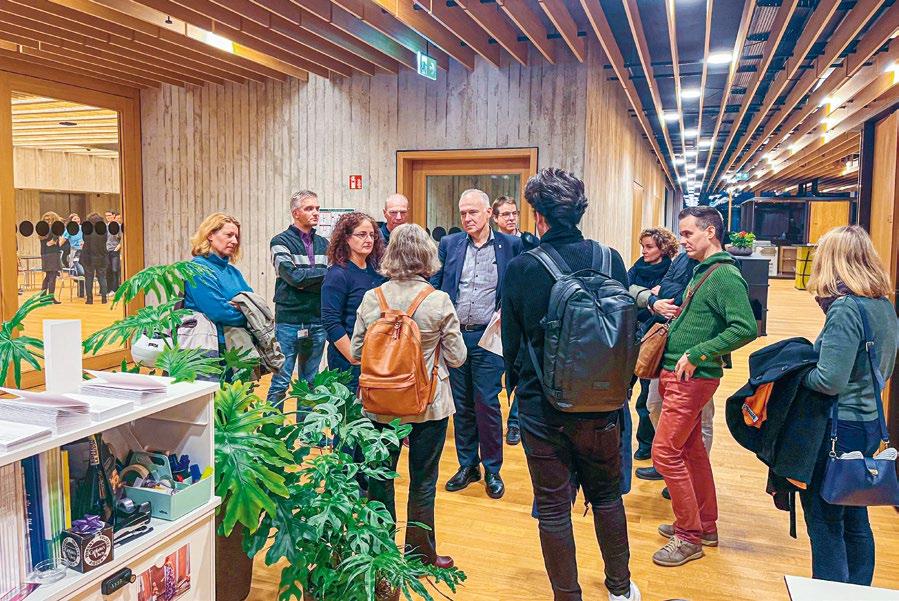

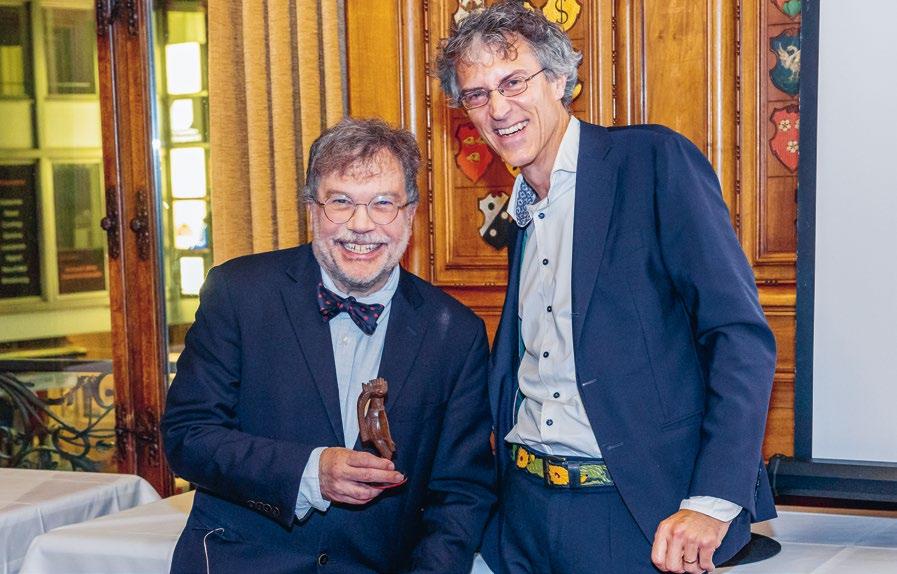

Eva Herzog, Member of the Swiss Council of States from Basel, has been President of the Board of Governors of Swiss TPH since 2023. In this interview, she tells us what makes Swiss TPH unique, what priorities she would like to set, and how at the political level, she is committed to Switzerland being a hub for research and innovation.
Eva Herzog, you have been President of the Board of Governors since the beginning of 2023, and were already a member of this highest supervisory and decision-making body of Swiss TPH for two years before that. What was your first point of contact with Swiss TPH?
Eva Herzog: “I’ve known and admired Swiss TPH for decades. I was in Africa for the first time 34 years ago, in Côte d’Ivoire, to visit my brother, who lived and pursued research there for a few years. As I had to get vaccinated for this trip, my first visit to Swiss TPH was at the Centre for Tropical and Travel Medicine. As a Basel resident, I was of course familiar with the ‘Tropeli’, as Swiss TPH was known for many years. During my academic work in the Vice-Rectorate for Research at the University of Basel and later as a member of the Basel-Stadt government, I got to know Swiss TPH better. When I returned to Côte d’Ivoire as President of the Board of Governors at the beginning of 2023, I met some of my brother’s staff again. Those were wonderful encounters.”
You are the first woman to be President of the Board of Governors. Will you do something different from your male predecessors?
Eva Herzog: “Fundamentally, I am deeply committed to strengthening the role of women in leadership. Within the institute, I think it’s important to achieve a balance with at least one
third of women in leadership positions and to promote women’s issues. Being a woman in a leadership position also means that you have a role model function. Within the scope of my influence, I will work to remove barriers to balancing family and career. As far as improving health on a global scale, the empowerment of women in the health system and gender medicine are important topics for me.”
How would you like to make your mark during your term as President of the Board of Governors?
Eva Herzog: “Swiss TPH is not sufficiently known in Switzerland, even though it’s the largest Swiss public health institute. Around the world, it is a renowned institute in the field of global health and unique in its combination of research, education and services. As President of the Board of Governors, I also see my role in making Swiss TPH better known within Switzerland.”
You have long advocated that Swiss TPH should play a leading role in preventing and combating future epidemics and pandemics. Why do you think Swiss TPH is suited to fill this role?
Eva Herzog: “What has always fascinated me about Swiss TPH is the interplay between research and application, between science and society. Social factors are considered just as important in the fight against diseases as the tools
needed, like medicines or vaccines. Swiss TPH played an important role throughout the COVID-19 pandemic, whether in providing data to inform policy decisions or in conducting research on the spread and control of the disease in Switzerland and internationally. Swiss TPH in collaboration with other institutions could play an even more important role here in the future.”
What other strategic goals should Swiss TPH pursue?
Eva Herzog: “I see my role primarily in supporting Swiss TPH at the political level. For example, I’m committed to funding the Swiss Citizen Cohort – a large-scale national long-term study initiated and coordinated by Swiss TPH, in partnership with other research institutes. The aim of this study is to collect data to better understand the health of the population, and is critically important in order for us to remain internationally competitive in research, as well as to have the necessary data to be able to better react in future crises. This is groundwork that Switzerland must be prepared to undertake.”
As a member of the Council of States, you are, among other things, on the Commission for Science, Education and Culture and consequently you have a hand in shaping policy in these areas. How
should politics promote research in Switzerland and what is the importance of Swiss TPH in this?
Eva Herzog: “For the 2021 – 2024 strategy period, we obtained an increase in federal funding for Swiss TPH within the parliament, but now there’s a threat of cuts for the research institutions in the next strategy period. Yet, it’s clear to me that we must not cut corners in education and research, all the more so since Switzerland is currently still excluded from the European Framework Programme for Research and Innovation known as Horizon Europe. Swiss research institutions need access to these European programmes for their reputation and to remain internationally competitive. Recently, there have been signs that the Federal Council will move towards a mandate for negotiations that could open the doors for discussions, but under no circumstances should funds be cut now.”
Swiss TPH has been operating from its new headquarters “Belo Horizonte” in Allschwil since 1 April 2022. What do you see as the opportunities at the new location?
Eva Herzog: “Having all staff and students working under one roof now is a great opportunity for enhanced cooperation. The new infrastructure with state-of-the-art laboratories is also very im-
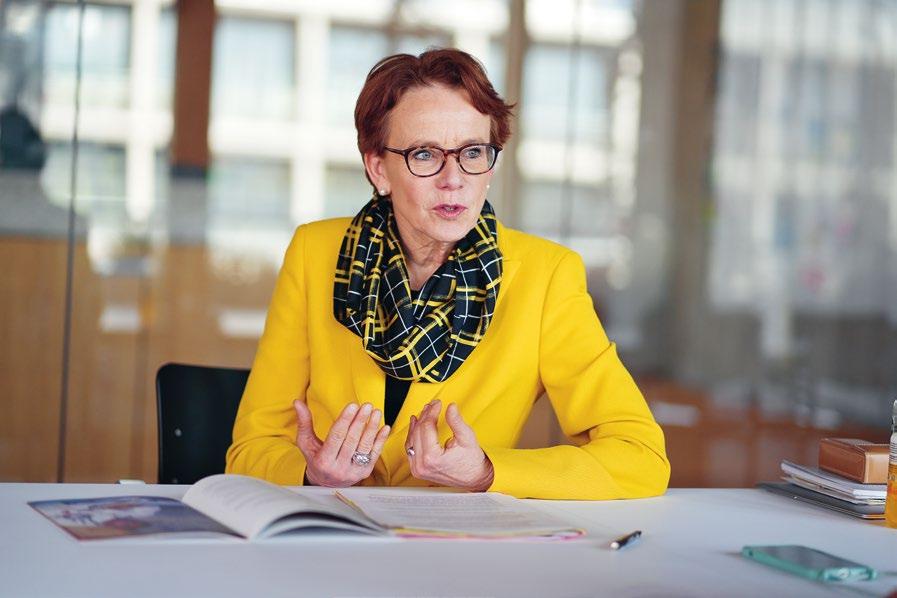
portant if you want to play a central role in public health. The environment of the life science cluster at the new headquarters is also interesting for additional collaborations. However, the public transportation to get to “Belo Horizonte” still needs to be improved. The new headquarters in Allschwil is also an example of successful cooperation between Basel-Landschaft and Basel-Stadt.”
And finally: What moment at Swiss TPH has been particularly memorable for you so far?
Eva Herzog: “What impresses me most is the diversity of people with different experiences and cultures who work together to improve people’s health. During my visits to Mozambique and Côte d’Ivoire, I directly experienced what makes Swiss TPH so special: North-South cooperation that is not just on paper, but is actively lived. It is the relationship between Swiss TPH and their partners that promotes the mutual exchange of knowledge and experience which make the institute such a unique place. This kind of cooperation should serve as a role model.”
Eva Herzog was a member of the legislative for the Social Democratic Party (SP) in the Canton of Basel-Stadt from 2001 to 2005, and a member of the Basel-Stadt government and head of the Department of Finance from 2005 to 2020. She has been a member of the Council of States in the Swiss Parliament since 2019.
Eva Herzog studied history, economics and Spanish at the University of Basel and the University of Santiago de Compostela. She became politicised in the “Fair Trade Shop movement ” of the time. Following her dissertation, she worked as a scientific collaborator in the Vice-Rectorate for Research at the University of Basel and as a cultural manager.
Eva Herzog has been a member of the Board of Governors of the Swiss Tropical and Public Health Institute (Swiss TPH) for 2 years, before she took over the Presidency in January 2023.
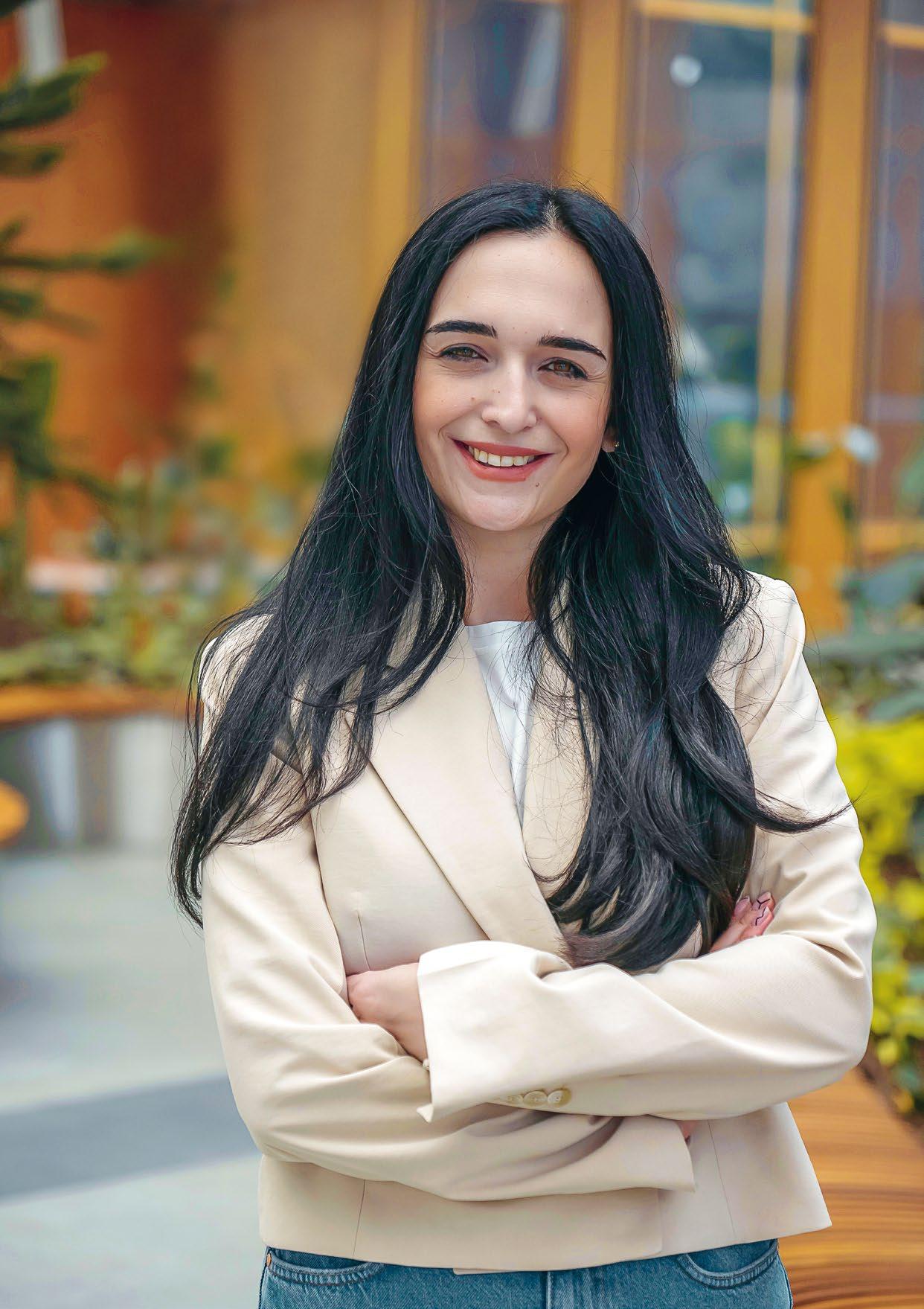
“My job is to boost the visibility of our project and stakeholders and to develop communication strategies for sustainable outcomes. We deliver concise, easy-tounderstand messages about non-communicable diseases. It motivates me to be part of the collective effort to improve access to health services for Kosovo’s citizens.”
Zana Aqifi, Senior Communication Officer, Accessible Quality Healthcare (AQH) project in Kosovo
Together with our partners, we currently work on 363 projects in 119 countries.
963 Employees at Swiss TPH
Long-term Partnerships
Swiss TPH has a long-standing collaboration with research institutes in Tanzania, Côte d’Ivoire, Chad, Lao PDR, Papua New Guinea and Peru, all of which have played an integral role in the history and strategic development of Swiss TPH.
≥ 10 projects
≥ 5 projects
≥ 1 project
Swiss TPH offices
363 Projects to improve people’s health and well-being
234 Employees based abroad
Universidad Peruana Cayetano Heredia, Peru Universidad Peruana Cayetano Heredia, Peru Centre Suisse de Recherches Scientifiques en Côte d’Ivoire (CSRS)Centre Suisse de Recherches Scientifiques en Côte d’Ivoire (CSRS)
729 Employees based in Basel
Centre de Support en Santé Internationale (CSSI), Chad
Ifakara Health Institute (IHI), Tanzania
Centre de Support en Santé Internationale (CSSI), Chad
Lao Tropical and Public Health Institute (Lao TPHI), Laos
Facts
and Figures
Nations represented at Swiss TPH
Ifakara Health Institute (IHI), Tanzania
119 Countries in which we work
Lao Tropical and Public Health Institute (Lao TPHI), Laos
Papua New Guinea Institute of Medical Research (PNGIMR), Papua-Neuguinea
Swiss TPH is a world-leading institute in global health, with a particular focus on low- and middle-income countries. By uniquely combining research, education and services, we aim to improve the health and well-being of people through a better understanding of disease and health systems and by acting on this knowledge.
Swiss TPH works across a value-chain, from innovation and validation to application. Innovations such as new diagnostics, drugs and vaccines or approaches and tools are rigorously validated in real-world settings and applied and integrated into health systems and policies.
Medical Parasitology and Infection Biology (MPI)
MPI studies diseases of poverty and develops diagnostics, drugs and vaccines to combat them
Medicine (MED)
MED provides clinical and diagnostic services and conducts clinical research in low-resource settings
Improving Health
Epidemiology and Public Health (EPH)
EPH studies health and diseases in relation to their social, ecological and genetic determinants
Education and Training (ET)
ET offers local, national and international training programmes and courses at graduate and postgraduate levels Swiss Centre for International Health (SCIH)
SCIH provides policy advice, project design and management in the area of national and global health
The five departments at Swiss TPH work across three fields –research, education and services – to improve health globally.
Facts and Figures
Infectious Diseases
Public, Environmental & Occupational Health
Tropical Medicine
Parasitology
Environmental Sciences & Ecology
General & Internal Medicine
Microbiology
Science & Technology
Pharmacology & Pharmacy
Immunology
Research & Experimental Medicine
Health Care Sciences & Services
Biochemistry & Molecular Biology
Chemistry
Respiratory System
Other Topics
Distribution of “research areas” of Swiss TPH publications in 2022 according to Web of Science (accessed: April 2023)
Scientific output: 538 peer-reviewed publications spanning topics such as infectious diseases and public, environmental and occupational health, to immunology and microbiology.
The 2030 Agenda for Sustainable Development with the 17 Sustainable Development Goals (SDGs) provides a compass to tackle the global challenges we face, including those related to poverty, inequality, climate and health.
Swiss TPH is committed to the achievement of the SDGs, placing particular emphasis on SDG 3 “Ensure healthy lives and promote well-being for all at all ages” and Universal Health Coverage (UHC). With our research projects and service mandates, we contribute to 14 of the 17 SDGs.

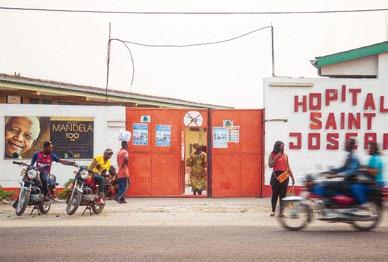
Tanzanian study of 6,700 children, published in the New England Journal of Medicine, indicates for the first time that children who slept under bed nets at an early age were more likely to survive from malaria into adulthood. The study, led by researchers from Swiss TPH, the Ifakara Health Institute (IHI) and the London School of Hygiene & Tropical Medicine (LSHTM), provides unique insight into the long-term benefits of malaria control in young children, as it includes a remarkably high number of participants and follow-up after 20 years.

The need for effective COVID-19 treatments remains an issue, especially in sub-Sa haran Africa where access to vaccines is still extremely limited. The ANTICOV clinical trial, a consortia led by the Drugs for Neglected Diseases initiative (DNDi) with partners including Swiss TPH, has started recruiting participants to test a new promising drug combination, fluoxetine and budesonide, as an early treatment for people affected with mild-to-moderate COVID-19.
Maurice M. Nigo is the Director of the Institut Supérieur des Techniques Médicales in Bunia, one of the poorest provinces of the Democratic Republic of the Congo. Since the 1990s, an armed conflict has been raging in the region, which further escalated in recent years. Rebels are destroying healthcare infrastructure, and access to nutrition and safe drinking water has become a concern for almost the entire population. On World Neglected Tropical Diseases Day, Maurice shared insights into his work evaluating the burden and combating infectious diseases.

Increasing Awareness of Noma The limited data on the incidence and prevalence of noma hinders the management and treatment of this disease, which affects predominantly children living in extreme poverty. Swiss TPH researchers conducted the first systematic review on the distribution of noma, published in The Lancet Infectious Diseases. The publication contributes to a better understanding of the epidemiology of the disease and lays the groundwork for systematic control interventions.
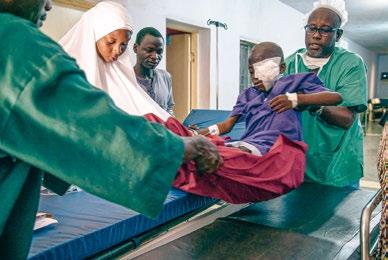
Legionellosis Cases Continue to Increase in Switzerland Switzerland has one of the highest legionellosis incidence in Europe. The number of legionellosis cases in Switzerland has increased five-fold over the past 20 years. A study by Swiss TPH published in the International Journal of Hygiene and Environmental Health analysed case numbers from 2000 to 2020 and determined the potential impact of the COVID-19 pandemic on reporting. The researchers also found that the summer peaks of legionellosis have become more pronounced in recent years.
New Swiss TPH Headquarters Opened On 1 April 2022, the new headquarters of Swiss TPH called “Belo Horizonte” officially opened in the BaseLink site, an emerging life science and biotech cluster in Allschwil. Around 700 employees and students will work, research and study in the new building designed by Basel architects Kunz und Mösch. More than 300 guests attended the inauguration from the areas of politics, business and science, as well as from the local neighbourhood in Allschwil.
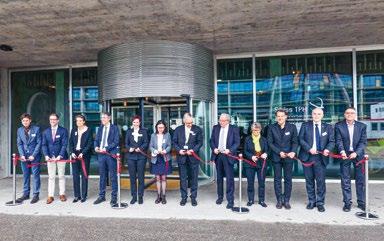
→ The Legionella bacteria cause legionellosis and are transmitted from water or soil.
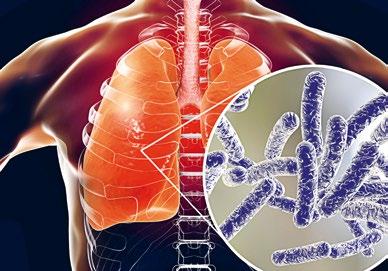
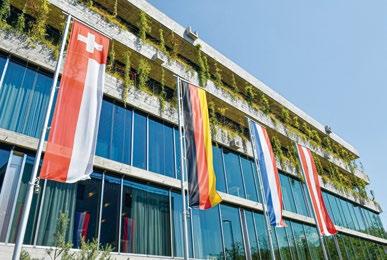

Digital tools are critical to improve the care for sick children, particularly in resource-constrained settings. In a new study, Swiss TPH and partners showed the positive impact of ALMANACH, a digital clinical decision support system, on improving the management of childhood illness in primary care in Nigeria. The findings, published in BMJ Open, support the use of digital tools for health systems strengthening on a broader scale.
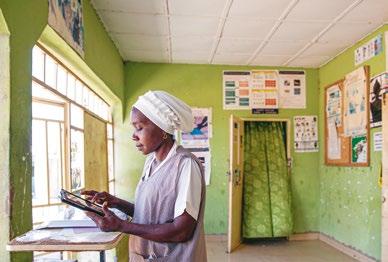
Nicole Probst-Hensch Wins Science Award of the City of Basel The government of Basel-Stadt honoured Nicole Probst-Hensch, Head of the Department of Epidemiology and Public Health at Swiss TPH with this year’s Science Award. She re ceived this prize for her pioneering research on the effects of air pollution on human health and her achievements in establishing biobanks and long-term cohort studies. Probst-Hensch and her team help to understand the prerequisites of health in societies and to determine the foundations for maintaining it.
Consultation for Improved Pandemic Preparedness in Switzerland Swiss TPH brought stakeholders from Switzerland and neighbouring countries together to discuss the role of science and politics in enhancing preparedness and response to future health emergencies. The overarching aim was to share and compare experiences and lessons learned during the COVID-19 pandemic across systems and settings.
A Narrowing Window for Change: Experts Call for Global Climate Action Climate change is an imminent threat to human health and well-being and to our planet. Urgent action is needed in order to reduce climate risks and secure a liveable future. To support policy-makers on climaterelated action, the Intergovernmental Panel on Climate Change (IPCC) sixth assessment report was published, providing a detailed evaluation of the impact of climate change globally. Swiss TPH contributed to the chapter on the impact of climate change on health and well-being.
Children Not Less Active During COVID-19 Pandemic The SOPHYA study of Swiss TPH and partners investigated the physical activity and sports behaviour of children and adolescents throughout Switzerland over a period of five years. Physical activity did not decrease during the COVID-19 pandemic. Results also showed that the living environment and physical activity of the parents have a significant influence on physical activity behaviour during childhood and thus have a long-term impact on the health of children and later adults.

SARS-CoV-2 Genomic Surveillance in Africa
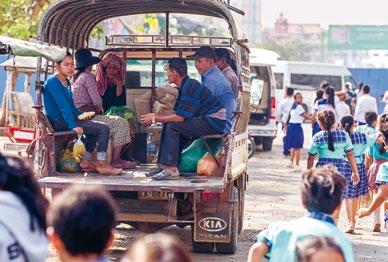
A new study in Science shows how the rapid expansion of genomic surveillance in Africa allowed the continent to describe the introduction and spread of SARS-CoV-2 variants. Over 300 authors worked together, making it the largest consortium of scientists and public health institutions work ing together to support data-driven COVID-19 response in Africa. Swiss TPH contributed to these efforts as part of the SARS-CoV-2 surveillance programme in Equatorial Guinea.
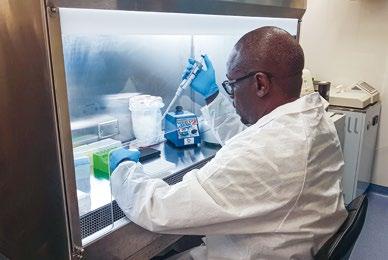
Swiss TPH Designated as WHO Collaborating Centre for Verbal Autopsy Swiss TPH was selected due to its extensive experience with civil vital registration systems and its support to the World Health Organization (WHO) since 2015. The primary objective of verbal autopsy is to describe the pattern of causes of death that occur outside of medical care. As such, it has become an essential public health tool for identifying causes of death when a medical certificate is not readily available, and thus tailoring public health responses.
Peter Hotez Visits Swiss TPH Peter Hotez, an internationally recognised scientist in neglected tropical diseases and vaccine development, visited Swiss TPH. He met with faculty and students and gave lectures, including a public talk in Basel. Hotez is a pioneer in global health, known for taking a bold stance against anti-science aggression and acting as a leader in vaccine research and innovative models for equitable access.
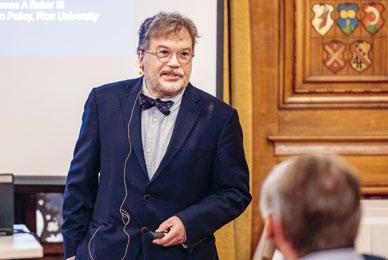
Improving Diagnosis for Extrapulmonary Tuberculosis
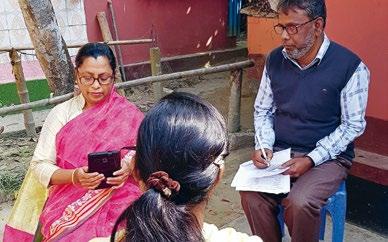
A clinical trial in Tanzania tested a diagnostic algorithm including point-of-care ultrasound to increase the proportion of correctly managed patients of tuberculosis (TB). While the proportion of correctly managed patients could not be increased, the study, published in Clinical Infectious Diseases, indicates that this diagnostic algorithm could be a feasible approach to increase confirmation of TB.
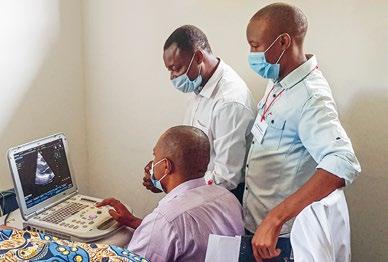
at Swiss TPH The Swiss National Science Foundation (SNSF) has awarded two Starting Grants to Emma Hodcroft for virology and Samuel Fuhrimann for sustainable agriculture. Hodcroft, co-developer of Nextstrain, will use the Nextstrain programme, able to track virus outbreaks in real time, to study enteroviruses. Fuhrimann aims to characterise the pesticide exposome and related health risks as well as benefits of living and working on a farm.

Julia Bohlius Is Awarded the Dora Seif Prize On 19 December 2022, the Basel-based Dora Seif Foundation awarded the Dora Seif Cancer Research Prize to Julia Bohlius, Head of the Department of Education and Training at Swiss TPH. She receives this prize for her outstanding contributions in assessing the burden of cancer in people living with HIV, improving the quality of care for women at high risk for cervical cancer, and developing clinical guidelines for oncology interventions.

Researchers Lorenz Hofer and Mgeni Tambwe are trying to stop malaria transmission in Tanzania. Astrid Knoblauch is distributing drugs to combat tuberculosis with the help of drones in Madagascar. For this, the R. Geigy Foundation awarded them with the 12 th R. Geigy Award 2022. The Foundation awards this prize every two years to young researchers and public health specialists who distinguish themselves through outstanding achievements in the field of poverty-related and neglected tropical diseases.

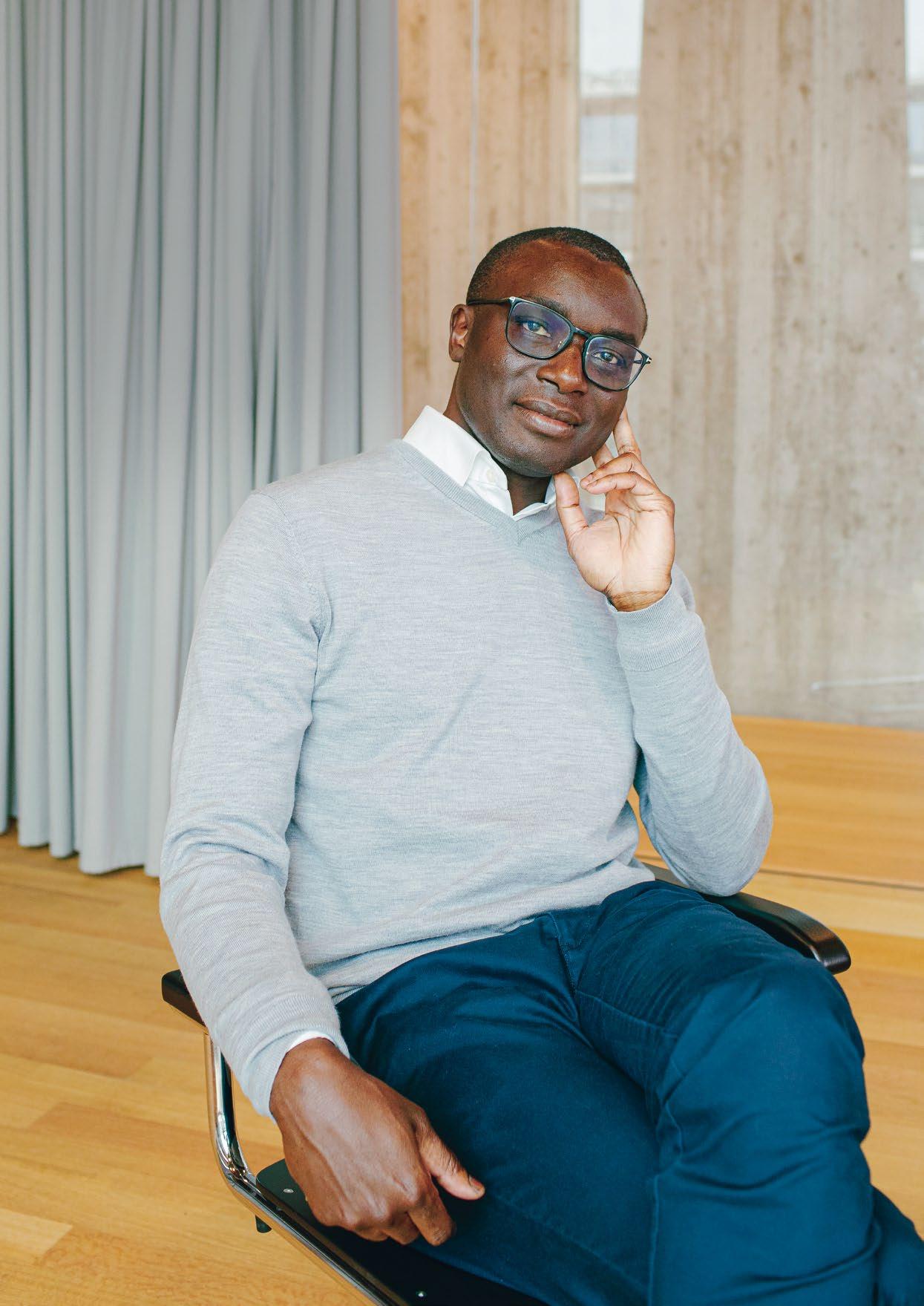
“I am involved in clinical trials to evaluate the impact of novel diagnostics on pa tient outcomes, and research to identify the main health needs of migrants and refugees. Through my work, I aim to improve the well-being of people around the world.”
Charles Abongomera, Medical Doctor, Swiss TPH
Swiss TPH has over 30 years of expertise on air pollution and its health effects on children and adults. Over the years, evidence generated by Swiss TPH researchers and partners led to policy changes that improved people’s health. Join us as we take a look back with Nicole Probst-Hensch, who had a pioneering role in the research of air pollution and health.
On the night of 1 November 1986, 1,350 tonnes of highly toxic chemicals burst into flames in the Schweizerhalle near Basel, Switzerland. The disaster caused devastating ecological damage. Life in the Rhine river was wiped out over several hundred kilometres, and it took years for the river to recover. Environmental damage, including air pollution, became a growing concern in Switzerland, and there was a pressing need to better understand the potential health effects of exposure to air pollutants.
“The first Swiss TPH researchers in the field of environmental epidemiology, were shaped by the events of Schweizerhalle,” recalls Nicole
Probst-Hensch, Head of the Department of Epidemiology and Public Health at Swiss TPH.
In 1991, the SAPALDIA (Swiss Study on Air Pollution and Lung Disease in Adults) cohort was initiated by a group of epidemiologists led by Ursula Ackermann-Liebrich and pneumologists led by Philippe Leuenberger to investigate the relationship between air pollution and respiratory health in adults living in Switzerland. Starting in eight different geographical regions and including 10,000 participants, SAPALDIA became a world-renowned cohort and is still the only population-based Swiss national cohort with a biobank.

“We recognised the importance of epidemiological long-term studies and cohorts as well as biobanks early on,” said Probst-Hensch. Biobanks store human samples over a long period of time, and they allow studying the biological effects of environmental factors on human health. ProbstHensch and her team further developed biobanks over decades in the context of SAPALDIA, and contributed significantly to a better understanding of the health status of the Swiss population and the main risk factors, including in particular air pollution and its influence on chronic diseases.
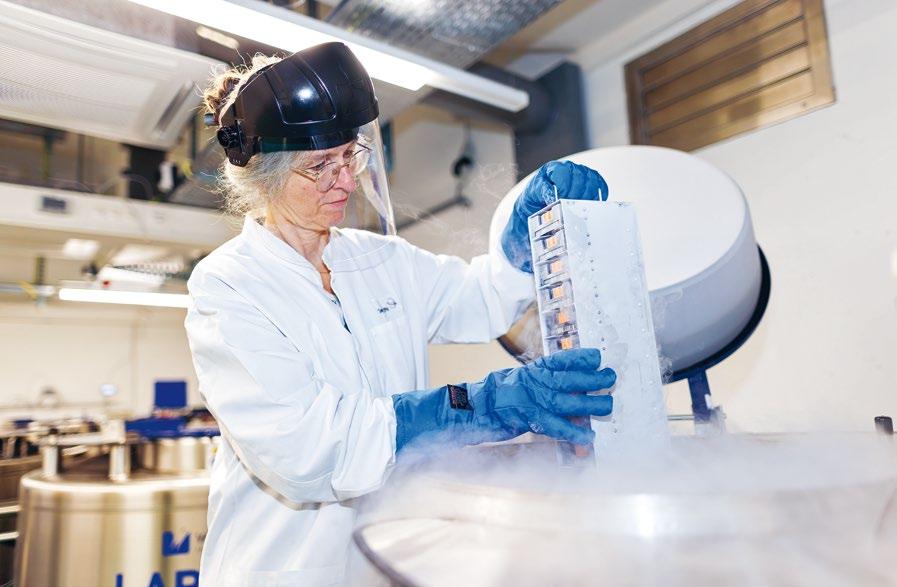
We now know that air pollution has a wide range of effects on human health, including accelerated ageing. It can cause illness and death, ranging from mild physiological changes, through acute effects such as heart attacks and strokes, to chronic diseases such as osteoarthritis, dia-
betes and lung cancer, which ultimately reduce life expectancy.
The global burden of air pollution is considerable according to the World Health Organization (WHO), around seven million people die prematurely each year as a result of air pollution.
WHO data show that almost all of the world’s population (99%) breathes air that exceeds WHO guidelines and contains high levels of pollutants. “This means that virtually everyone is exposed to unhealthy levels of air pollution throughout their lives,” said Probst-Hensch.
What we know today about the effects of air pollution on health and well-being has been demonstrated over the last few decades thanks to studies such as SAPALDIA. The first results from the SAPALDIA study provided the evidence that air pollution harms respiratory health. Higher levels of air pollution led to a higher prevalence of respiratory distress, more frequent chronic bronchitis, reduced lung function and a more frequent incidence of other respiratory symptoms.
“Virtually everyone is exposed to unhealthy levels of air pollution throughout their lives”→ Biobanks store human samples over a long period of time, and they allow studying the biological effects of environmental factors on human health.
These results together with other air quality studies provided the scientific basis for the Swiss Federal Council to introduce a limit value for particulate matter in 1998.
About ten years later, researchers from the SAPALDIA study provided the world’s first evidence that improvements in air quality, particularly reductions in particulate matter, have a positive long-term effect on the respiratory health of adults.
Since 1985, Swiss TPH has also managed LUDOK, the Swiss literature database on air pollution and health. On behalf of the Federal Office for the Environment, LUDOK reviews and summarises the scientific literature on air pollution and health in order to advise policy-makers, scientists and the public. “We have been working very closely with governmental agencies to guide their policies on air pollution,” said Meltem Kutlar Joss, Project Leader of LUDOK at Swiss TPH.
Swiss TPH advises policy-makers on the formulation of evidence-based health policies. Swiss TPH experts are members of the WHO Air Quality Guidelines Steering Committee, the world’s leading reference for setting science-based national air quality standards to protect human health. Swiss TPH experts also sit on the Swiss Federal Commission for Air Hygiene, which provides policy-makers with scientific advice on health and environmental issues. Swiss TPH is also member of the Federal Labour Commission and the expert commission that oversees the law on human genetic testing.
In 2009, the former Institute of Social and Preventive Medicine of the University of Basel was integrated into the former Swiss Tropical Institute and it was renamed Swiss Tropical and Public Health Institute (Swiss TPH). With the integration, expertise was expanded to include research on environmental health and the epidemiology of non-communicable diseases, genetic epidemiology and social sciences.
“We started to broaden our focus, which was mainly Swiss, to an international level. We worked
with partners in low- and middle-income countries with the highest exposure to air pollution and were able to contribute our many years of knowledge and expertise to various international projects and policy advisory roles,” said ProbstHensch.
The SAPALDIA cohort and in particular its biobank has enabled Swiss TPH to participate in multi-country European cohorts, where larger numbers of study participants are needed to determine complex effects of environmental exposures on health in the context of exposome science – which looks at all the external factors a person is exposed to during their lifetime and how these interact with individual characteristics, such as genetics, to affect health.
As part of the SAPALDIA study and larger international research collaborations such as the European ESCAPE study or the EXPANSE project, Swiss TPH has been able to conduct research on the short- and long-term health effects of air pollution in Switzerland and elsewhere, providing evidence such as the correlation between long-term exposure to particulate matter and natural mortality. Based on more than 30 years of research, Swiss TPH ultimately contributed to new WHO guidelines. In 2021, WHO presented its new global air quality guidelines, which aim to protect the health of populations by reducing key air pollutants. “There is an urgent need for policy action to be taken from these guidelines to benefit the health of everyone, in particular the most vulnerable populations,” said Nino Künzli who was involved in the development of these guidelines and is a member of the WHO Global Air Pollution and Health Technical Advisory Board. As president of the Swiss Federal Commission of Air Hygiene, he will be shaping the future air quality goals of Switzerland.
SAPALDIA has evolved from an air pollution cohort to a broad ageing, genomic and exposomic study. To advance research on environmental, behavioural and lifestyle factors in chronic diseases, public health researchers in Switzerland joined forces and published a white paper at the end of 2022. They argued for a large cohort and biobank with more than 100,000 participants of all ages. Switzerland has a high prevalence of
chronic diseases such as cardiovascular diseases, cancer, diabetes and also depression.
“The Swiss citizen cohort and biobank would provide a unique opportunity to study the complex interplay of genetic, environmental and lifestyle factors that contribute to the development of these diseases,” said Probst-Hensch. In addition, the data could help to identify personalised prevention and treatment strategies and provide policy-makers with an evidence base for shaping policies and urban environments for healthy living and well-being.
Probst-Hensch N, Bochud M, Chiolero A, Crivelli L, Dratva J, Flahault A, Frey D, Kuenzli N, Puhan M, Suggs LS, Wirth C. Swiss Cohort & Biobank –The White Paper. Public Health Review, 2022, 43:1605660.
DOI
https://doi.org/10.3389/phrs.2022.1605660
1991 Start of the SAPALDIA study at 8 different sites in Switzerland, including 10,000, randomly selected healthy persons
1998 Swiss Federal Council introduces limit value for particulate matter, SAPALDIA served as the scientific basis
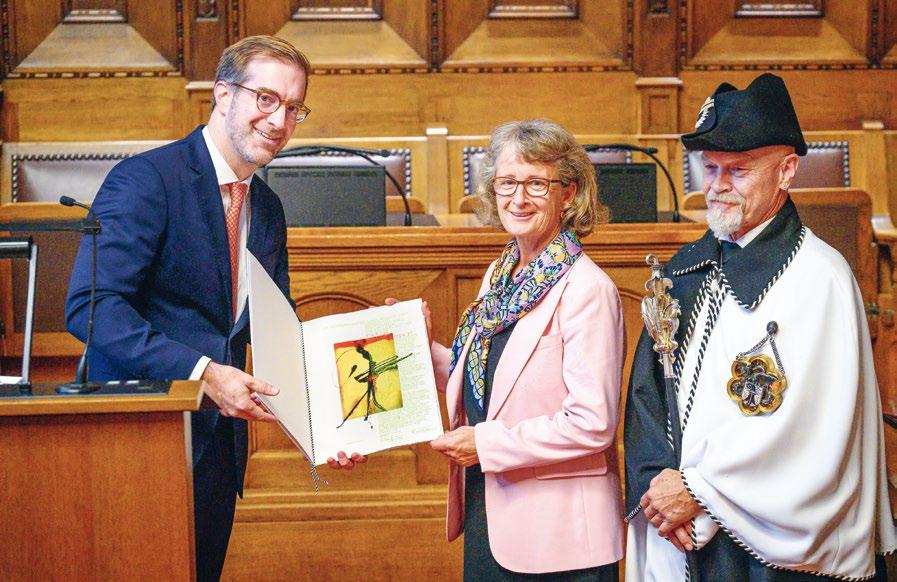
2007 Worldwide first evidence that improving air quality, especially reducing particulate matter, has long-term positive health effects
2014 Researchers demonstrate that long-term exposure to particulate matter correlates with natural mortality
2021 New WHO air quality guidelines – Swiss TPH has contributed for 30 years with multiple long-term studies and policy advice
The field of global health is full of opportunities to enhance the health and well-being of people worldwide, but the path to success is rarely straightforward. Sometimes, researchers find themselves grappling with the question: What happens when the outcome of a study does not deliver the desired results? The CARAMAL project team was faced with this issue, demonstrating that even the most promising ideas can encounter unforeseen challenges.
The Community Access to Rectal Artesunate for Malaria (CARAMAL) project, a large-scale study that investigated the roll-out of rectal artesunate (RAS) in the Democratic Republic of the Congo, Nigeria and Uganda, was designed to be a game changer for young children suffering from severe malaria.
With the introduction of RAS as pre-referral treatment administered by health workers in remote villages, the hope was to bridge the time until the sick child was transported to a hospital where comprehensive post-referral care is available.
The results were sobering: researchers found that when used as an emergency treatment under real-world conditions, RAS did not improve the odds of survival for children with severe malaria.
“Our findings point to an inconvenient but important truth,” said Manuel Hetzel, malaria expert at Swiss TPH. “We found that the overall management of severe malaria cases is so poor in many areas with a high malaria burden, that adding a single product does not seem to make a positive difference. Our focus must be on investments in improving existing health systems instead of relying solely on individual interventions.”
The study, which was published in October 2022 in BMC Medicine, included 6,200 severely ill children under the age of 5 years in remote resource-constrained settings. “RAS was previously shown in a controlled study to have a beneficial effect when it was followed by adequate post-referral care at a hospital,” added Hetzel. “But more often than not, children do not finish the entire treatment due to lack of transportation to hospitals, cost of transport and treatment, or poor quality of care at hospitals. On its own, RAS is not sufficient to cure severe malaria.”
The current WHO guidance on using RAS as pre-referral treatment is based on a randomised controlled trial that took place between 2000 and 2006 in Ghana, Tanzania and Bangladesh. This trial offered limited guidance on introducing RAS at scale. “Under real-life conditions, many factors influence whether an individual is appropriately treated and cured, which is why
“Our focus must be on investments in improving existing health systems instead of relying solely on individual interventions.”
interventions that work well in a controlled trial may not always fulfil their potential in real life.” said Phyllis Awor, CARAMAL co-investigator at the Makerere University School of Public Health in Uganda.
be addressed to ensure a functioning continuum of care before pushing for a large-scale rollout of pre-referral RAS,” said Hetzel. “Without a comprehensive approach that acknowledges the complex realities faced by caregivers and health workers in remote, underserved areas, children will continue to die from malaria, and promising interventions such as RAS will fail to meet their full potential.”
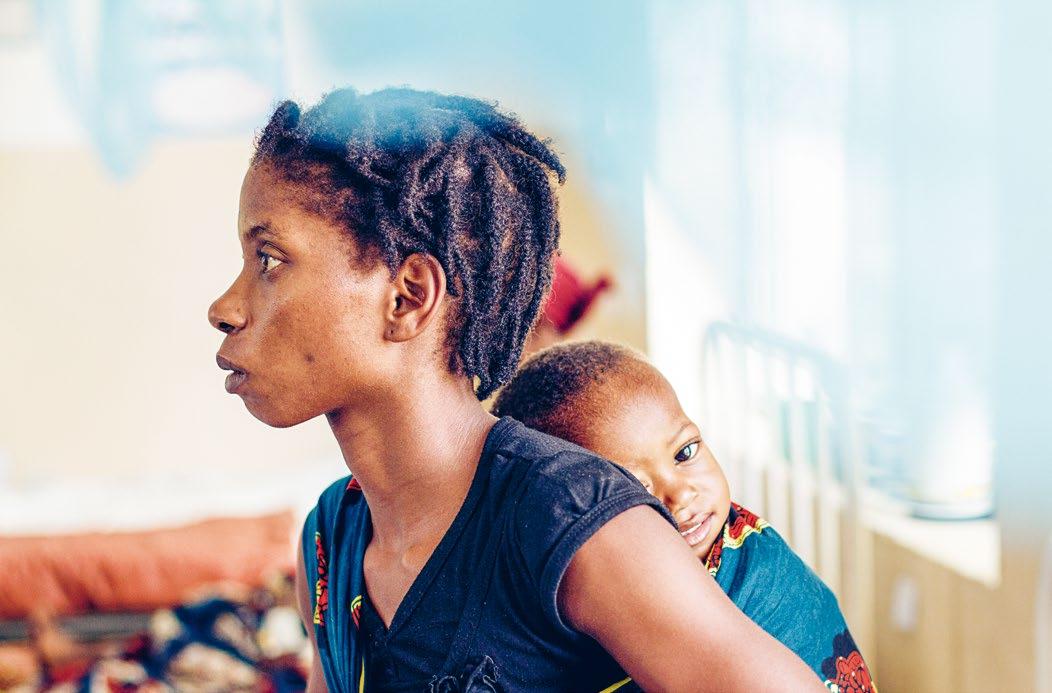
Based on the results of the CARAMAL study, the WHO issued an Information Note in October 2021 recommending that countries either temporarily delay scale-up, or urgently review the conditions under which RAS is currently being used. At present, a team of WHO-appointed experts are reviewing all available evidence to develop guidance on the safe implementation of pre-referral RAS in highly malaria-endemic countries.
“The real-world evidence generated in our study identified health systems constraints that must
The CARAMAL project was an observational study that accompanied the introduction of pre-referral RAS in the Democratic Republic of the Congo (DRC), Nigeria and Uganda between 2018 and 2021. It is the first study of its kind to look at the introduction of quality-assured RAS in existing community-level healthcare systems at a large scale. The project was implemented by the Clinton Health Access Initiative (CHAI), Unicef and Swiss TPH, with funding from Unitaid. Swiss TPH was responsible for the evidence generation jointly with the University of Kinshasa School of Public Health in the DRC, Akena Associates in Nigeria, the Makerere University
“Interventions that work well in a controlled trial may not always fulfil their potential in real life.”→ The Community Access to Rectal Artesunate for Malaria (CARAMAL) project that investigated the roll-out of rectal artesunate (RAS) in three countries was designed to be a game changer for young children suffering from severe malaria.
School of Public Health in Uganda, and Pasteur Institute of Cambodia. Medicines for Malaria Venture and WHO also supported the project. Key study findings were presented in more than ten scientific publications.
Hetzel MW, Okitawutshu J, Tshefu A, et al. Effectiveness of rectal artesunate as pre-referral treatment for severe malaria in children under 5 years of age: a multi-country observational study. BMC Medicine 2022, 20:343
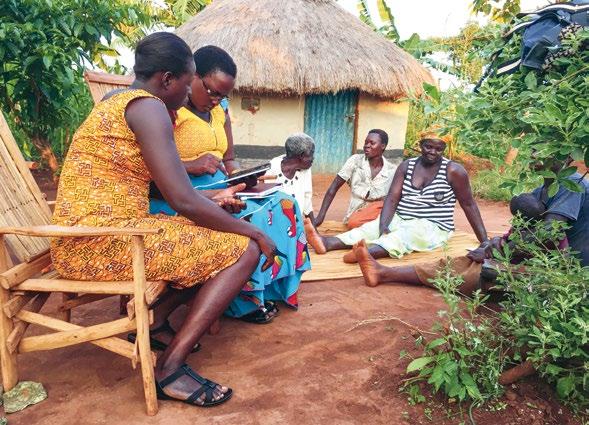
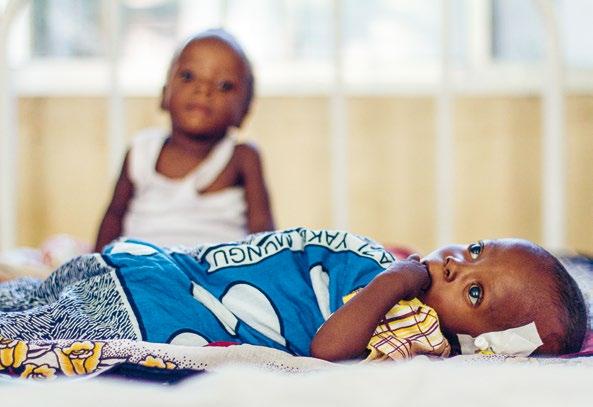
DOI https://doi.org/10.1186/s12916-022-02541-8
In remote villages, where immediate injectable malaria treatment is not available, health workers may administer pre-referral RAS suppositories as emergency treatment to children with severe malaria. The treatment quickly reduces the number of malaria parasites in the blood and helps bridge the time until the child is admitted to a hospital for comprehensive post-referral care. Post-referral care for severe malaria includes an intravenous antimalarial, followed by a full oral course of artemisinin-based combination therapy, plus antibiotics and measures to manage potential complications.

“Cervical cancer elimination in sub-Saharan Africa: where are we now and what do we have to improve?
To find out, together with my team, we developed a tool to monitor cervical cancer control programmes in sub-Saharan Africa, with a focus on women living with HIV.”
Maša Davidović, Medical Doctor and PhD Candidate at Swiss TPH
For 80 years, we have grown and developed our activities and strengthened partnerships around the world. Through our three strategic goals – excellence in science, taking science to impact and mutual learning for sustainable development – we commit to improving the health and wellbeing of people through a unique combination of research, education and services.
Our mission is to make the world a healthier place. We ensure that we achieve this by continuously assessing the impact that our activities have on people and populations, reporting on the progress that we make within our strategic goals and topics and demonstrating our contri-
bution to the Sustainable Development Goals (SDGs). This year, we are proud to share some highlights of the progress that we have made within our eight strategic topics which range from environment and health to statistical and mathematical modelling.
The diverse portfolio of projects, initiatives and programmes at Swiss TPH are grouped into eight strategic topics (STOs). In each STO, we work across departments and along our value chain,
from innovation and validation to application, to improve health on a global scale. The STOs reflect key emerging issues in global health and are linked to the SDGs.
STO– 1
Generating new insight into the biology and molecular epidemiology of poverty-related infectious diseases.
STO– 2
Developing, validating and applying drugs, diagnostics, vaccines, vector control measures and computational tools for the improvement of global health.
STO– 3
Defining markers for disease control and surveillance and conducting research using cohorts and biobanks by means of longitudinal characterisation of participants.
STO– 4
Improving the health and well-being of people by addressing determinants of health in humanenvironmental systems.
STO– 5
Striving for social justice in health and engaging with people in the process.
STO– 6
Translating evidence and strengthening health systems and policies.
STO– 7
Assessing the healthcare needs in mobile populations, internally displaced people and international refugees, while maintaining an institutional expert group for outbreak investigation.
STO– 8
Generating evidence on disease and health through the development and application of computational, statistical and mathematical modelling of biological disease and epidemiological data.
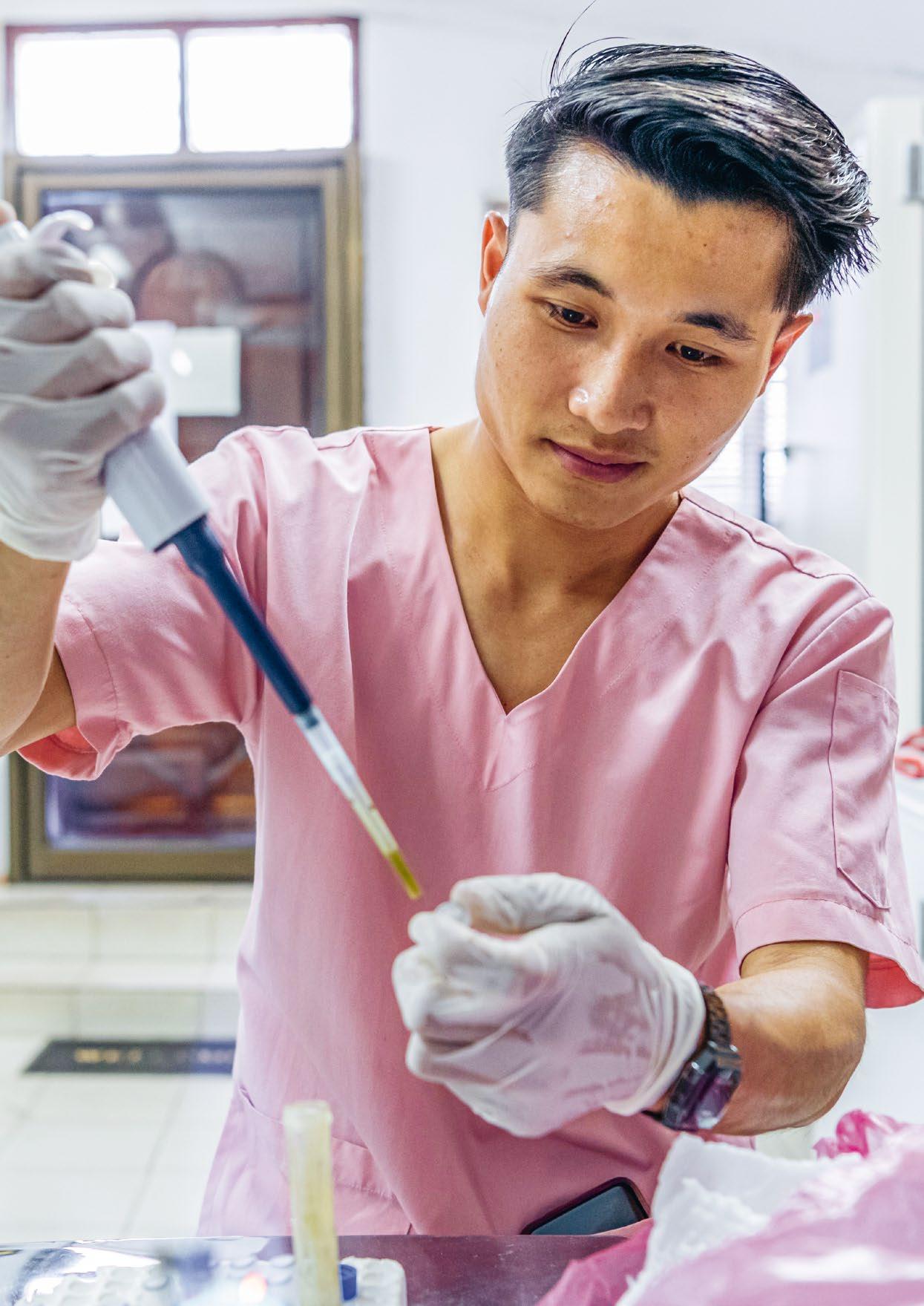
Swiss TPH, in collaboration with the Ifakara Health Institute (IHI) and ETH Zurich, is leading a new SNSF-funded research project on the virulence-transmission trade-off, i.e. the reduction of host fitness caused by the pathogen, in human tuberculosis (TB) caused by different phylogenetic lineages of the Mycobacterium tuberculosis complex (MTBC). The project aims to study subclinical TB, where patients shed live TB bacilli but do not show symptoms, in the context of the trade-off. The aim is to understand the differences between “ancient” and “modern” MTBC lineages causing subclinical or active TB. This project builds on our previous work on host-pathogen genetic interactions in TB, where we have gained a detailed understanding of the genomic diversity of the human host and MTBC populations in Dar es Salaam, Tanzania.
To advance the clinical development of oxfendazole as an anti-parasitic treatment against parasitic worm infections, Swiss TPH successfully led the regulatory oxfendazole phase I clinical trial at the Ifakara Health Institute (IHI) in Tanzania. The clinical trial assessed the safety and bioavailability of the drug oxfendazole, which is used in veterinary medicine. This is the first time Swiss TPH has taken on the role of regulatory sponsor. No safety concerns were identified in the study. It is part of the Helminth Elimination Platform (HELP), an EU funded public-private partnership, working together to create a drug development pipeline against soil-transmitted helminth infections.
Quality of care for children between 2 and 59 months old in the South-Central Somali region has been improved significantly following the implementation of a digital health tool that provides clinical decision support to healthcare providers. The application has been instrumental in improving adherence to evidence-based diagnostic and treatment protocols, leading to targeted medication prescription, improved antibiotic stewardship, and ensures key interventions such as malnutrition screening and preventive medication. The project, in partnership with the International Committee of the Red Cross (ICRC) and the Somali Red Crescent Society (SRCS), also enables health managers to use aggregated clinical data to detect outbreaks early and improve the health system where it is most needed.
Swiss TPH led the first of four papers in a Lancet-commissioned series on the contribution of One Health approaches (at the intersection of people, animals and the environment) to improving global health security across a range of health threats as reported in the WHO International Health Regulations (2005). One Health approaches appear to be most effective and sustainable in the prevention, preparedness, and early detection and investigation of emerging risks and threats. To maximise and extend the benefits, there is a need to improve the operationalisation of One Health by strengthening multisectoral coordination mechanisms at national, regional and global levels.
new TB project aims to understand why some patients have TB bacteria in their body but do not show symptoms, while others get sick from TB.
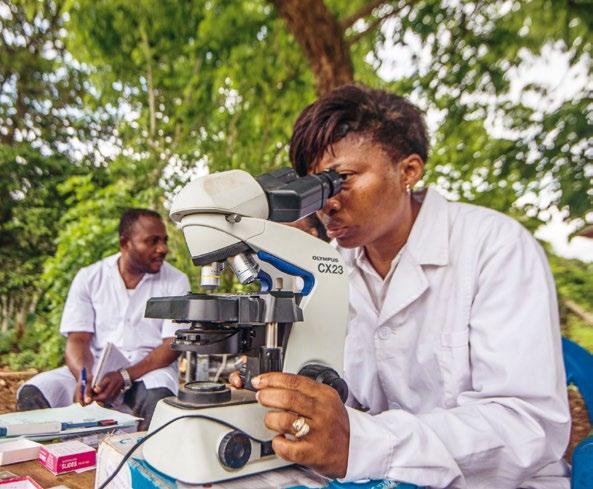
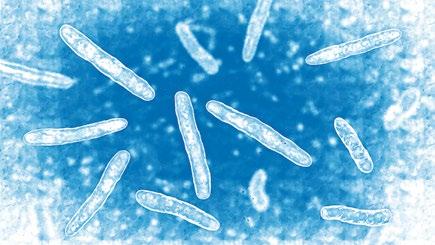
tools support healthcare professionals in the diagnosis of diseases and prescription of medications.
approach is crucial for preventing, monitoring and responding to future public health emergencies.
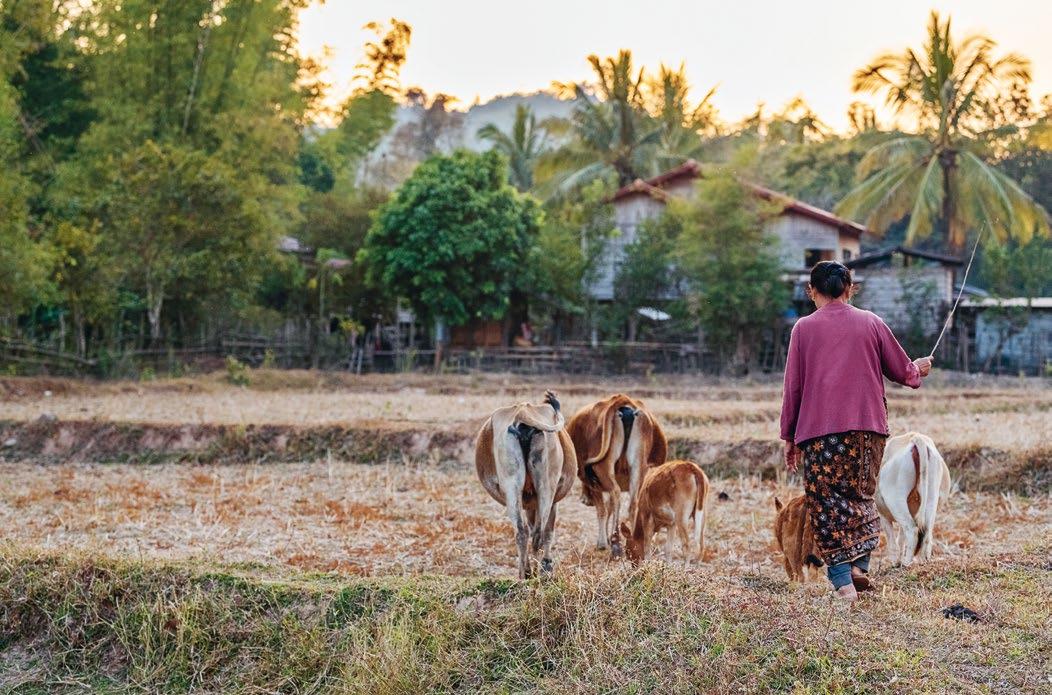
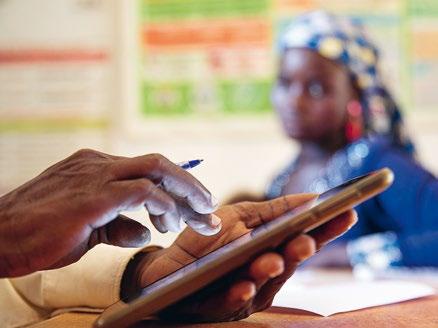
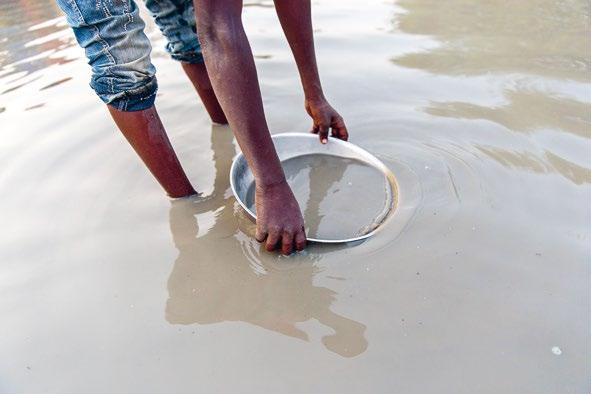
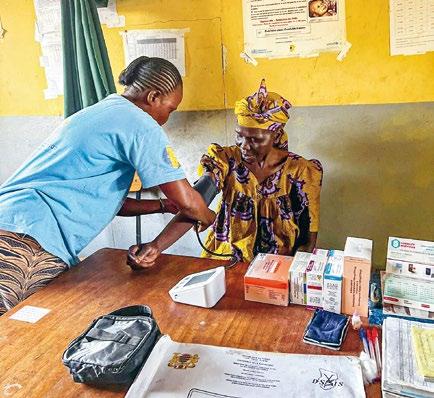
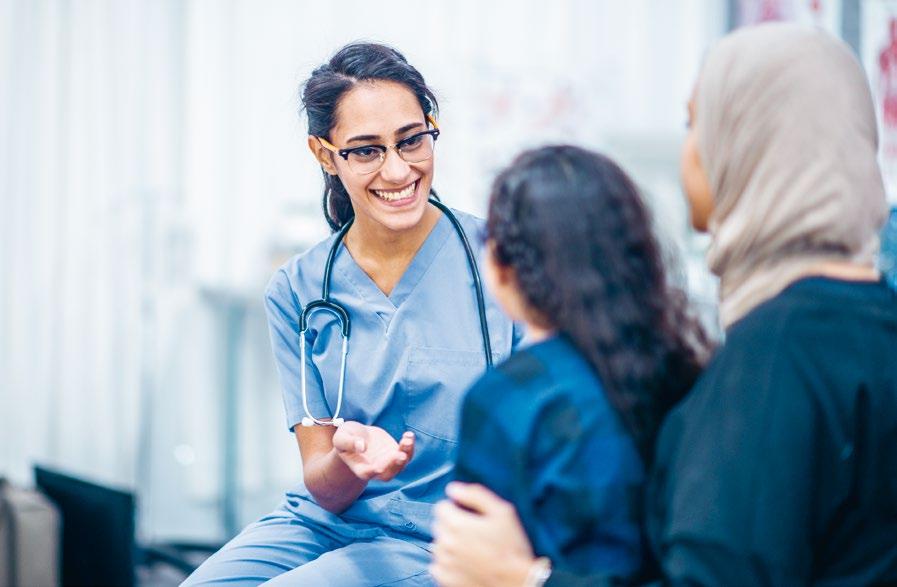

In the aftermath of the COVID-19 pandemic, the importance of science communication and integration of citizens in research became even more evident. Swiss TPH contributed to scientific publications focusing on vaccine communication and uptake, and participated in the development of an experimental platform for democratic crisis communication. We further continued to develop our expertise in citizen science in various fields ranging from health impacts of electromagnetic fields, over citizen-led elimination of disease transmitting insects to reducing violence against healthcare in fragile countries in collaboration with international partners such as ICRC.
Swiss TPH contributes to the State of Universal Health Coverage (UHC) Commitment, which provides a consolidated, multi-stakeholder overview of progress towards UHC by 2030. Evidence is integrated across quantitative and qualitative data from policy document reviews, governmental and non-governmental surveys, global indicator repositories, media sources and country consultations, and features in the UHC Data Portal. Swiss TPH also co-leads the European hub of the Systems Thinking Accelerator (SYSTAC) for the WHO Alliance for Health Policy and Systems Research. The “systems thinking” approach aims to implement intervention with a particular attention to the engagement of those directly concerned: health workers, patients and the public.
Migrants, refugees and internally displaced people are recognised as vulnerable populations. Swiss TPH supports migrant health through various innovative programmes and new teaching modules. For example, we are using digital methods to track and respond to the migration and humanitarian crisis in northern Mozambique, expanding disease control to mobile pastoralists in Chad, and applying an epidemic surveillance and response analysis system to improve epidemic preparedness in Côte d’Ivoire and Nepal. To support healthcare professionals globally, Swiss TPH has launched a number of postgraduate courses, including “Sexual and reproductive health and people on the move” and the “Migration Health” course.
The effectiveness of artemisinin-based combination therapies to treat Plasmodium falciparum malaria is threatened by drug resistance. We have developed a disease modelling approach with emulator-based global sensitivity analysis to identify which factors drive the establishment and spread of drug resistance. The findings highlight the complex interplay between various factors that contribute to drug resistance and underscores the importance of molecular surveillance and developing sustainable treatment options to mitigate drug resistance and ensure effective malaria treatment. This information can be used to guide future malaria treatment strategies and efforts to combat drug resistance.
“I run the mosquito testing laboratory, where we research the effectiveness of new products and strategies against various disease-transmitting mosquitoes. My work is dedicated to advancing our understanding of these critical vectors and developing innovative solutions to protect public health both in Switzerland and around the world.”
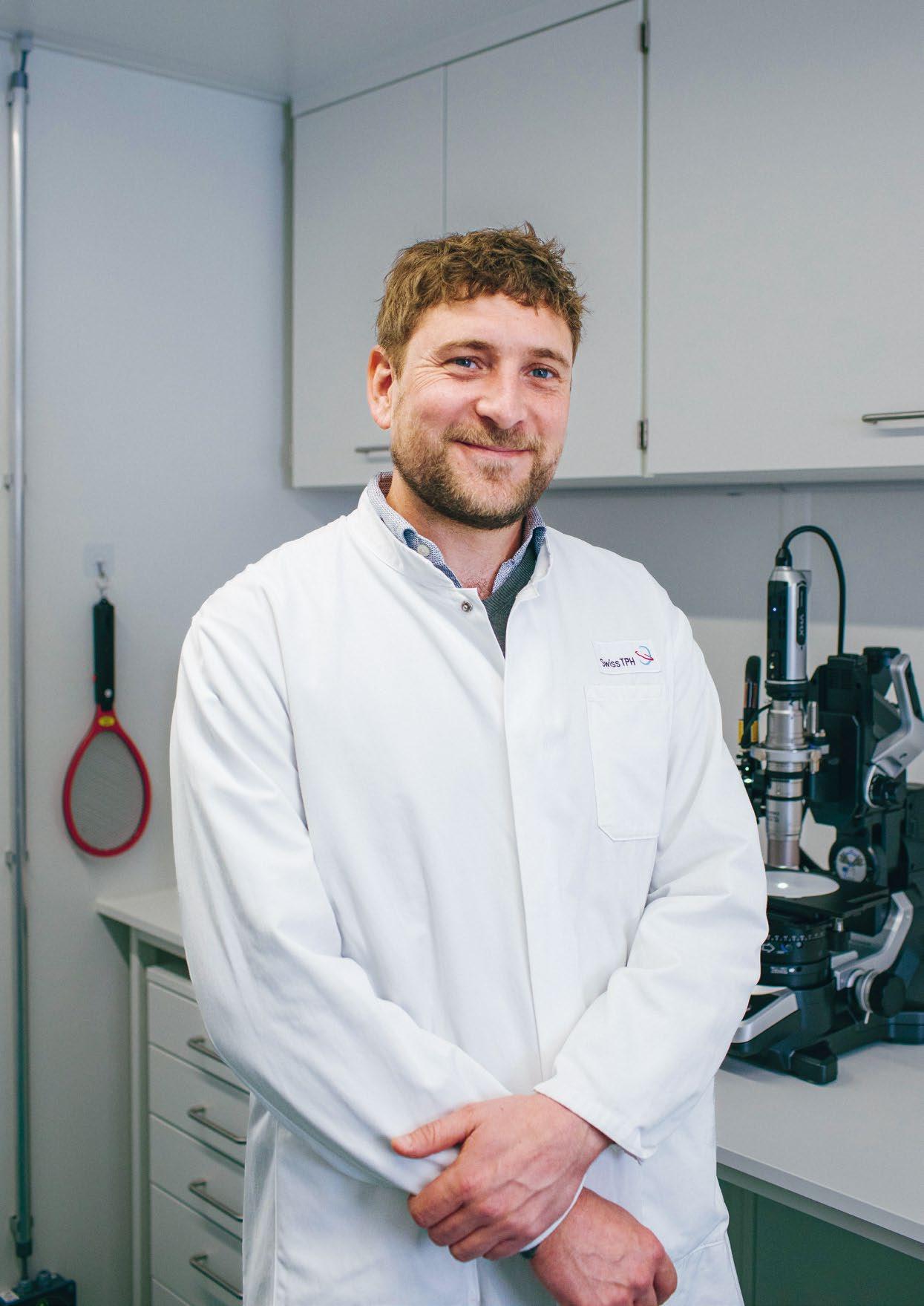
Tobias Suter, Medical Entomologist, Swiss TPH
Directorate
Board of Governors
Directorate
Prof. Dr. Jürg Utzinger Director
Prof. Dr. Kaspar Wyss Deputy Director
Mathias Kronig Administrative Director
Additional Members of the Managing Board
Prof. Dr. Julia Bohlius
Prof. Dr. Sébastien Gagneux
Prof. Dr. Daniel Paris
Prof. Dr. Nicole ProbstHensch
Dr. Eva Herzog
President of the Board of Governors, Member of the Council of States, Canton of Basel-Stadt
Dr. Rolf Borner
Director Infrastructure and Operations, University of Basel
Dr. Ariane Bürgin
Head of Higher Education, Cantonal Department of Education, Basel
Prof. Dr. François Chappuis
Head of Tropical and Humanitarian Medicine Division, Geneva University Hospitals
Prof. Dr. Sabina De Geest Director, Institute of Nursing Science, University of Basel
Dr. Alban Frei Head of Higher Education, Directorate of Education, Culture and Sport of the Canton of BaselLandschaft
Dr. Lutz Hegemann
President Global Health and Sustainability, Novartis International AG
Dr. Olivier Küttel
Head, International Affairs, EPFL, Lausanne
Dr. Cornelia Staehelin Senior Physician, University Hospital Bern
Dr. Luca Tratschin
Observer, Scientific Advisor at State Secretariat for Education, Research and Innovation, Bern
Prof. Dr. Jürg Utzinger Director, Swiss TPH (ex officio)
Mathias Kronig
Administrative Director, Swiss TPH (ex officio)
R. Geigy Foundation: Foundation Board and Administration
Prof. Dr. Marcel Tanner
President of Foundation Board (until 31. December 2022), Director emeritus, Swiss TPH
Prof. Dr. Jürg Utzinger
President of Foundation Board (as of 1. January 2023), Director, Swiss TPH
Prof. Dr. Christoph B. Bühler
Vice-President of Foundation Board, Lawyer, LL.M., Honorary Professor, University of Zurich
Dr. Lukas Meier
Managing Director
Beat Berger Foundation Board Member, Managing Director, Berger Liegenschaften
Stefan Mörgeli Foundation Board Member, Administrative Director emeritus, Swiss TPH
Prof. Dr. Nicole ProbstHensch Foundation Board Member, Head Department Epidemiology and Public Health, Swiss TPH
Daniel Rüedi Foundation Board Member (as of 1 January 2023), CEO Baumann & Cie., Banquiers, Basel
Jürg Toffol Foundation Board Member, Dipl. Architect ETH SIA
The Department of Medical Parasitology and Infection Biology (MPI) investigates the biology and transmission of pathogens. Findings from this research inform the development of new diagnostics, treatments, and vaccines against malaria, tuberculosis, schistosomiasis, Chagas and other neglected tropical diseases.
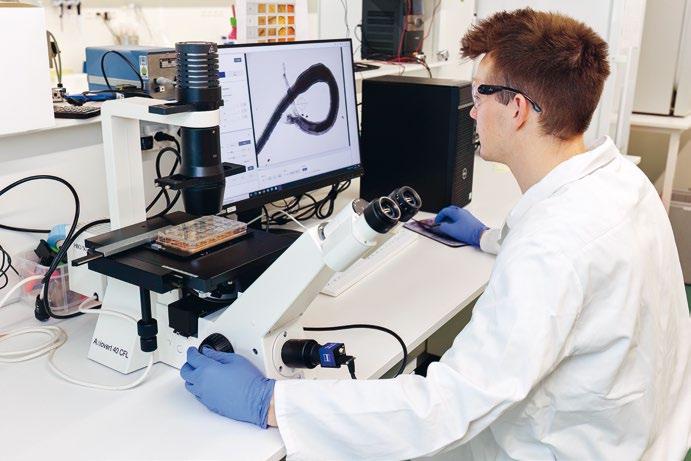 Sébastien Gagneux, Head of MPI
Sébastien Gagneux, Head of MPI

her Swiss TPH collaborators Fabrizio Tedioso f rom the department of Epidemiology and Public Health (EPH) and Peter Steinmann from the Swiss Centre for International Health (SCIH). Together they will assess the feasibility, acceptability and cost-effectiveness of albendazole-ivermectin based deworming programmes in partnership with the Ministry of Health of Uganda.
Another project was awarded by the Swiss National Science Foundation (SNSF) “Sinergia” programme to Sébastien Gagneux, Damien Portevin (both MPI), Klaus Reither (MED) and Jacques Fellay from the EPFL. This project will continue Swiss TPH’s long-standing collaboration with the Ifakara Health Institute Tuberculosis Research Group focusing on subclinical tuberculosis. Claudia Daubenberger contributes to a large project consortium funded by the National Institutes of Health investigating the vaccine hypo-responsiveness in malaria pre-exposed populations.
Researchers at MPI study the molecular and cellular mechanisms underlying pathogen biology and the ways pathogens interact with their human hosts. They use various infection models and clinical studies to investigate the host immune responses to infection as well as the molecules and processes influencing the course of disease.
Researchers explore how these pathogens develop, undermine host immunity and evolve drug resistance, and how these phenomena influence pathogen transmission. They analyse the dynamics of infection, the biological changes linked to the different pathogen life cycles, and the effects of interventions such as vaccinations and therapies on the host microbiome and on the population structure of these pathogens.
Researchers also develop novel infection models to evaluate interventions. They use their knowledge of the host- and pathogen biology to test new diagnostics, drugs and vaccines in preclinical and clinical studies.
Highlights in 2022
Claudia Daubenberger’s Clinical Immunology unit demonstrated that blood retained in standard rapid diagnostic tests for malaria detection can be used to monitor other bloodborne parasites, in par ticular highly neglected filarial nematodes (published in PLoS Neglected Tropical Diseases). Tiffany Bouchery’s group developed a new in vitro method to test drug candidates against hookworms (Pharmaceuticals). Jennifer Keiser’s Helminth Drug Development unit found that differences in the gut microbiome of people undergoing anthelmintic therapy were associated with distinct treatment outcomes (Nature Communication). Damien Portevin’s group reported further progress on the diagnostic front for monitoring tuberculosis treatment efficacy (Frontiers in Medicine). Pascal Mäser’s Parasite Chemotherapy unit was part of the consortium, together with Novartis and the University of Glasgow, that developed a new drug candidate for African trypanosomiasis ( Journal of Medicinal Chemistry).
Several competitive research grants were acquired by MPI scientists during 2022. These included an award by the Principal Investigator Initiative of the Botnar Research Centre for Child Health (BRCCH) to Jennifer Keiser and
MPI has strengthened its expertise in virology by successfully recruiting two outstanding young group leaders. Emma Hodcroft was awarded an SNSF Starting Grant to study the evolution and epidemiology of enteroviruses. Katharina Röltgen was awarded an SNSF PRIMA grant to study the immunology of COVID-19 in an African context. Pascal Mäser was promoted to Full Professor of Infection Biology at the University of Basel.
The Department of Epidemiology and Public Health (EPH) investigates distribution and causes of infections and non-communicable diseases. To understand and promote the well-being of people in different cultural and environmental contexts, EPH applies various methods ranging from anthropology and social science to biostatistics and mathematical modelling as well as observational cohorts with biobanks
In 2022, EPH had a total of 167 projects and generated CHF 10.4 million in new funding. With around 150 employees and 130 PhD students, EPH is the largest department at Swiss TPH with 11 unique research units.
Researchers from EPH demonstrated in a landmark New England Journal of Medicine paper that the survival benefit from early-life use of treated nets persisted to adulthood, based on data from a 22-year prospective cohort study in Tanzania.
EPH continued to support national malaria control programmes in Tanzania, Papua New Guinea and other countries with data and mathematical models to better tailor control interventions to local settings. The largescale implementation research project CARAMAL in DRC, Nigeria and Uganda for pre-referral treatment with rectal artesunate of young children with severe malaria pointed to serious health systems shortfalls that constrained the effectiveness of the intervention (see also page 28).
The move to the new building marked the inauguration of a new state-of-the-art Arthropod Containment Level 2/3 facility, enabling Swiss TPH to further expand its excellence in vector research and product development.
The SNSF-funded PRIMA project “SchistoBreak” accomplished the second period of interventions to support schistosomiasis elimination on Pemba island, Tanzania. Findings show that S. hematobium prevalence is overall low in Pemba. Yet, there are many human water contact sites with the intermediate host snail B. globosus and situated near schools or houses. They pose a risk for recrudescence and point to the need for targeted, multi-disciplinary and cost-effective interventions consisting of biannual mass drug administration, snail control and behaviour change.
Model-based estimates suggest that schistosomiasis prevalence in sub-Saharan Africa has decreased considerably between 2000 and
2015. The success was assigned to the scale-up of preventive chemotherapy and social and economic development.
Analytics and modelling for the COVID-19 pandemic are ongoing. Evidence of the risk to health given potential new virus variants was published and Swiss and European policy-makers were supported with evidence from models on the timing and role of boosting vaccine.
In the project “BlockRabies”, block chain technology is applied for the management of information between actors involved in post-exposure prophylaxis towards achieving zero human rabies deaths in Africa. The prototype app is being tested by first users in Côte d’Ivoire and Mali.
An SNSF SPIRIT grant was obtained for a cervical cancer project. Social scientists will examine the production and dissemination of cervical cancer knowledge in the local communities of Tanzania to identify opportunities for improving uptake of screening and treatment in the population.
Two new European Commission Horizon 2020 projects started in 2022 to which Swiss TPH contributes its expertise in environmental exposure and health: GOLIAT looks at 5G exposure and possible causal effects on health as well as the risk perception in the population, ETAIN looks at exposure to electromagnetic fields from a planetary health perspective.

The fifth follow-up of the Swiss-wide SAPALDIA cohort and biobank was completed. Data from the study suggest residential greenness may have health impacts through allergic sensitization, stress coping, or behavioural changes (see also page 24).
In the context of the University of Basel’s research fund for junior researchers, a low cost mental health intervention project was introduced in Kosovo.
Nicole ProbstHensch, Head of EPHStrategic areas: climate change and comparative cohorts
EPH research focuses on the broad causes and outcomes of global warming, including the risk of new infections or zoonosis that could emerge as well as health risks associated with heat waves.
Cohorts and biobanks are an essential instrument of public health research for studying health and well-being in their full complexity and for evaluating and adapting policies and implementation projects. EPH is currently implementing multigenerational cohorts in Lao PDR, Côte d’Ivoire, Peru and in the future in Switzerland. These cohorts will promote evidence-based policy and careers of junior researchers in the context of innovative science across departments from molecules to systems, from qualitative to quantitative and from observational to interventional science.
Congratulations to Samuel Fuhrimann, who was awarded a highly competitive SNSF Starting Grant, to Jordyn Wallenborn who was awarded a highly competitive SNSF Ambizione Grant, and to Manuel Hetzel who was promoted to Titular Professor at the University of Basel.
The Swiss Centre for International Health (SCIH) provides consultancy, project design and ideation, as well as project and grant management services. With multi-disciplinary teams in Switzerland and around the world, SCIH offers a broad range of expertise, including strategic consulting, project implementation, policy advice, implementation research and more.
SCIH aims to strengthen health systems and improve access to health services in low- and middle-income countries, with special attention to gender, equity and inclusion of the most marginalised and vulnerable groups. SCIH supports health systems development with a focus on Africa, the Balkans and Eastern Europe as well as Switzerland. SCIH has expertise in a broad range of topics, including primary healthcare development, health workforce strengthening, health financing, health information systems, programme performance monitoring, supply chain management, diseases of poverty and digital health.
A new USAID funded project, focused on strengthening Ukraine’s public health system, started in May 2022 under the lead of Pact. Swiss TPH is supporting the Ukrainian government to build surveillance-response and other essential public health capacities. In parallel, SCIH continued to implement the Swiss Medical Education Development Project, which improves the undergraduate, postgraduate and continuous professional education systems and strengthens the capacities of primary healthcare workers.
In the wake of the war in Ukraine and climate change, global food security has re-emerged as a major concern. Besides connecting the demand and supply side of food systems and engaging women and youth in secondary cities in Bangladesh, Kenya and Rwanda within the Nutrition in City Ecosystems (NICE) project, SCIH facilitates the operations of the SUN Donor Network. The Network supports and advocates for strong political commitment for nutrition at the global, international and country level.
Several long-term projects have allowed for the strengthening of primary and secondary healthcare services, as well as the quality of health services and accessibility improvements. A large number of individuals and households in countries such as Cameroon, Chad, Nigeria, Rwanda, Somalia, Tanzania, Albania, Kosovo and Moldova benefited from improved quality of care, increased health
service coverage and community engagement. This was achieved through different approaches, including strengthening social protection and health insurance schemes and insurance informatics solutions, namely openIMIS as well as the embedment of electronic clinical decision support systems guiding health workers in evidence-based patient evaluation and management. In all aspects of work, SCIH strives towards the achievement of the Sustainable Development Goals (SDGs) and progress towards Universal Health Coverage (UHC).
Implementation research
Implementation research plays an important role in addressing the practical issues faced by health systems worldwide. For example, with support from the Fondation Botnar, SCIH uses systems modelling and simulation to improve mental health services and suicide prevention in Colombia. By using innovative interactive digital tools and a transdisciplinary approach, better approaches to prevent suicide can be developed.
In 2022, two new projects funded by the Botnar Research Centre for Child Health (BRCCH) began. The first project uses new treatment schemes for child mass deworming in order to increase effectiveness and accelerate the way towards elimination of soil-transmitted helminthiasis and schistosomiasis in Uganda. The second project improves asthma control in adolescents using a smartphone-based digital health assistant designed for remote disease monitoring and patient coaching in Romania.
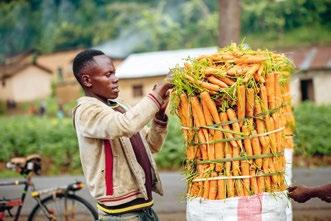
Services to the Global Fund and Gavi
SCIH continues to provide Local Fund Agent (LFA) services to the Global Fund, monitoring the implementation of programmes in HIV/ AIDS, tuberculosis and malaria and health systems strengthening. SCIH has a portfolio of 14 countries, mainly in Francophone and Anglophone Africa and the Middle East. SCIH has again been selected to provide quality assurance services for health facility assessments, quality of care and data quality review and completed assignments in Malawi (malaria indicator survey), Togo (malaria therapeutic
Kaspar Wyss, Head of SCIHefficacy study), and was awarded the harmonized health facility assessment in the DRC.
For Gavi SCIH performed the role of COVAX Monitoring Agent (Chad, Benin, Cameroon and Mali) and carried out several programme audits (Egypt, Burkina Faso, and started in Cameroon and Congo). In The Gambia, SCIH strengthened the capacity of the Expanded Programme on Immunization to staff, to support the effective use data for improved planning, monitoring and decision-making, as well as conducted the monitoring review of other Gavi grants. In Burundi, SCIH continued in the role of Monitoring Agent to ensure proper use of Gavi’s funding.
As of 1 January 2023, the former Health System Support unit has been split due to its size and complexity of portfolio into the Systems Strengthening and Health Promotion unit continued to be led by Helen Prytherch, and the Diseases and Programmes unit, headed by Peter Steinmann. After acting as the head of the Digital Health unit ad interim since January 2023, Fenella Beynon has been appointed as the new Head of this unit.

The Department of Medicine (MED) provides unique services in tropical and travel medicine and performs clinical research relating to drugs, diagnostics and vaccines with a focus on tropical and poverty-related diseases. The major pillars are the National Diagnostic Reference Centre for Imported Parasitic Diseases and an expanding Centre for Clinical Translational Research involving academia and industry related projects.
The Swiss National Diagnostic Reference Centre for Imported Human Parasitic Diseases supported Swiss hospitals and practising doctors in specialist diagnostics relating to tropical and travel medicine, and offered its services to a worldwide network. The Reference Centre performs over 50,000 specialised tests per year, and provides a dedicated 24/7 emergency service for malaria, diagnosing approximately 200 malaria cases in Switzerland per year. After the pandemic-associated decline in sample throughput, the workload stabilised to pre-pandemic levels in early 2022. Unfortunately, the Federal Department of Home Affairs (FDHA) implemented a linear tariff reduction of 10 % for all diagnostic tests per 1 August 2022, substantially affecting the field of parasitology due to the manual processing and microscopy procedures it involves.
The academic teaching and training activities in MED resumed their usual activities in 2022, and the return to face-to-face teaching was welcomed by students and lecturers.
The new research unit Medicines Development brings together the specialties of genotyping, diagnostics and vaccine development. MED now has three research units next to the two service-oriented units of “diagnostics” and “clinical operations”, which also provide services-for-research for academic and industry partners.
The landscape of regulations in clinical trials is evolving and the MED units invested substantially into updating processes, documentation and software platforms. The partnership with the Department of Clinical Research (DKF) at the University of Basel is going strong with collegial synergistic exchange on multiple large projects.
In 2022, a resurgence of regulatory and oversight activities occurred, whereby pharma companies and regulatory authorities announced an unprecedented number of audits and assessments. These activities reflect the broad interest in our services as a preferred
service provider for an increasing number of academic and industry-related partners.
The CARAMAL project revealed that rectal artesunate for children with malaria under real-world conditions should not be used in health systems where implementation approaches cannot meet the existing WHO guidelines (see also page 28).
Our Genotyping group observed an increasing prevalence of high-level sulfadoxine-pyrimethamine resistance in the Central African Republic, as well as changing efficacies of artemisinin-based combination therapies (ACTs) in the Great Lakes region of Africa. New activities include the development and validation of next generation sequencing techniques to monitor antimalarial drug resistance, and transmission in Côte d’Ivoire, Rwanda and Tanzania.
The TB TRIAGE+ large-scale community trial started recruitment of 20,000 participants in Lesotho and South Africa to assess the effectiveness and cost-effectiveness of TB screening algorithms with computer-aided detection software on chest-X-rays with and without C-reactive protein measurements.
The TB Practecal phase II/III clinical research project showed that a new all-oral six-month treatment regimen is safer and more efficacious at treating DR-TB than the current standard of care. These results were integrated into the new WHO guidance for the treatment of drug-resistant-TB in December 2022.
Thanks to the extensive planning and concerted effort of the diagnostic and IT teams, the Diagnostic Centre was up and running only 3 working days after the move to “Belo Horizonte”. The Diagnostic Centre now also supports clinical studies by providing services for quality control, diagnostics for trial endpoints, malaria genotyping and specific assay development. Multiple training events in malaria diagnostics and proficiency testing were per-
Daniel Paris, Head of MEDformed for pharmaceutical clients and in partner laboratories abroad.
The clinical statistics and data management (CSDM) team is growing and was involved in 12 clinical trials and 10 observational studies in 2022. The CSDM team contributed substantially to developing regulatory trial capacity and developed GxP standards in data management. The group now has several mandates for capacity building and teaches statistics courses to Master and PhD students for all Swiss universities.
Clinical operations operated in 22 countries in 2022. Activities included the setting up of studies in various phases; supporting co-monitoring for the largest COVID-19 study in Africa (ANTICOV); and acquiring large projects for evaluating new antimalarials in the Democratic Republic of the Congo. In collaboration with the Ifakara Health Institute, Swiss TPH acted as sponsor for the first phase I regulatory trial assessing the bioavailability of Oxfendazole.
Christian Nsanzabana was promoted to “Privatdozent” / University lecturer at the University of Basel, and was nominated for the American Society of Tropical Medicine scientific program committee.
Tracy Glass was invited to join the Steering Committee for the Summer School of the European AIDS Clinical Society.

The Department of Education and Training (ET) coordinates classes and programmes at Swiss TPH, the University of Basel and academic institutes around the world. In 2022, ET established its activities and services in the new learning facilities of the Swiss TPH headquarters in Allschwil.
The new Swiss TPH headquarters has six modern seminar rooms with capacity for 278 persons and is equipped with audiovisual technology for online and hybrid learning. Our 120 teachers, who train Bachelor, Master, PhD and postgraduate students, embraced the new infrastructure enthusiastically. Throughout the year, Swiss TPH faculty supervised about 240 MSc, MD, PhD and postgraduate MAS theses, and 524 participants were trained in postgraduate courses. Moreover, Swiss TPH’s Massive Open Online Courses (MOOCs) on Malaria Eradication and One Health reached several thousand learners in 2022.
The Postgraduate Professional Training unit conducted 37 courses. A total of 524 course participants from 39 countries engaged in our lifelong learning activities. In the spring of 2022, the 28th edition of the Health Care and Management (HCM) course began at our new headquarters. Twelve participants from nine different countries participated and graduated successfully with the Diploma of Advanced Studies in Health Care and Management. Special thanks to all those who contributed to the success of the courses, and the Basel City Stipend commission and the R. Geigy Foundation for supporting four course participants.
In the autumn of 2022, the 78th edition of the CAS course “Internationale Zusammenarbeit und Globale Gesundheit (IZGG)” was held with 41 participants in one or several of the modules offered within the IZGG. The course, which was previously known as “Allgemeiner Tropenkurs”, has been offered at Swiss TPH since 1944.
The SSPH+ Lugano Summer School in Public Health Policy, Economics and Management, jointly organised by SSPH+, Università della Svizzera italiana (USI), Scuola universitaria professionale della Svizzera italiana (SUPSI), and Swiss TPH, and supported by the Swiss Plexus scholarship programme of the Swiss Agency for Development and Cooperation (SDC) and other funders, was another highlight. ET coordinated the Swiss Plexus scholarship programme and managed the implementation of a key element of the 2022 – 2025 Swiss Plexus strategy, namely the co-creation of hybrid continued education hubs with part-
ners in low- and middle-income countries (LMICs) and Eastern Europe. Hybrid hubs consisted of a group of remote participants who gather in a place to attend synchronous online classes of the Lugano Summer School. With 15 courses attended by 195 students – the Lugano Summer School attracted students from 62 countries.
With support of the “Freiwillige Akademische Gesellschaft” (FAG), Basel, ET started to renovate the online microscopy tool for parasitology, which had been in use for more than 20 years. The updated version will be released in 2023.
The German Ministry of Foreign Affairs-funded GIBACHT project (Global Partnership Initiated Biosecurity Academia for Controlling Health Threats) successfully completed its third funding period, and the next proposal until 2025 has been granted. The consortium, which is made up of the Bernhard-Nocht-Institute for Tropical Medicine (BNITM), Robert Koch-Institut (RKI), the African Field Epidemiology Network (AFENET) and Swiss TPH implemented a training programme for more than 115 course participants on the issues of biosafety/biosecurity. Swiss TPH is leading the provision of the computer learning platform and online learning modules and plays an important role in the development of case studies by the course participants.
The new building offers a public, fully equipped library with learning spaces for 24 students and is accessible throughout the year. The Library and Documentation services team supports Open Science: of the more than 500 Swiss TPH publications in 2022, almost 90 % were available open access.
ET continues to strengthen digital solutions for online and hybrid teaching and training as part of the aim to lower Swiss TPH’s carbon footprint and to serve students’ needs. In the last year, ET with support of the Facility Management team conducted 20+ support sessions for the teaching faculty to familiarise them with the new AV system for hybrid teaching.
ET continued to coordinate the University of Basel PhD programme for Health Sciences
Julia Bohlius, Head of ET
(PPHS) and further contributed to the development of the inter faculty Graduate School Health Sciences (GSHS) between the Faculty of Science and Faculty of Medicine of the University of Basel.
Swiss TPH’s lively national and international partnerships in teaching and training, including with the SSPH+ network across 12 Swiss universities, has actively continued. The Ifakara Health Institute (IHI) in Tanzania, the Lao Tropical and Public Health Institute (Lao TPH) in Lao PDR, and the Cayetano University in Peru, are several examples. For example, Swiss TPH serves as a non-African partner for the Consortium for Advanced Research Training in Africa (CARTA), which supports the development of African academy leading world-class, impactful and multidisciplinary research.
In April 2022, Peter Odermatt took over as Head of the Bachelor, Master and Doctorate unit from Nino Künzli, who retired after more than 13 years of commitment to Swiss TPH, research and education in Switzerland and abroad. In September 2022, Christoph Pimmer took over as Head of the Teaching Technology and Didactics unit from Axel Hoffmann, who retired after 24 years of commitment to Swiss TPH, students a nd facilitators around the world. We also would like to thank Jacqueline Huber, Alena Zwahlen, Antoinette Zen-Ruffinen and Sarah Thiele for their outstanding work and commitment and we warmly welcome Cécile Bossart, Sung Hea Park, Evelyne Brodmann and Myrta Brunner. At the end of 2022, Christian Lengeler handed over the lead of the MSc Epidemiology to Peter Odermatt. Heartfelt thanks to Christian for his dedicated and successful leadership of the MSc for over 11 years.
The Department of Administration (ADMIN) is the backbone of Swiss TPH and supports the areas of research, education and services with the following units: Finances, Controlling, Human Resources, Informatics and Infrastructure. In total, about 70 people work in ADMIN at Swiss TPH.
In 2022, the largest project Swiss TPH was ever involved in – our new headquaters “Belo Horizonte” in Allschwil – was successfully completed and all official inspections could be finalised. In addition, the building and IT systems were regulated. Change management focused on onboarding new staff on continuing the support of employees as they settled in. Regular information events for staff and students were organised for this purpose.
ADMIN also adapted numerous processes to align with the new context and conditions in “Belo Horizonte”, all the way from logistics of the laboratories to IT processes. The final inspection of the new building with the State Secretariat for Education, Research and Innovation (SERI) was successfully completed as well in 2022.
The results of the Employee Engagement Survey (EES) 2022 already demonstrated positive effects of the new working environment on overall employee satisfaction.

The revision of the strategy of administration was launched. An internal project organisation was established with increased crossunit cooperation. An example of this was the digitalisation project of the onboarding process, which was successfully launched in 2022. The aim of the project is to streamline and simplify the processes for the hiring managers as well as for the new employees.
A focus was also placed on the transition from project completion work (pending items) to day-to-day business as well as on the development of a new digitalisation strategy with regard to IT needs and digital communication. In addition, a continuous improvement process was introduced.
In 2022, Swiss TPH was assessed by the Swiss Association for Quality. The team evaluated processes such as the Swiss TPH strategy development and the Employee Engagement Survey. Swiss TPH passed the quality assessment and is now entitled to use the label “Rec-
Mathias Kronig, Administrative Directorognised by EFQM” by the European Foundation of Quality Management (EFQM).
There were several organisational changes in ADMIN in 2022, including the appointment of Florian Frenzel as the new Head of the Infrastructure unit. Tatjana Bollmann has started as the new Head of Controlling and Saskia Strasser as Head of the Main Secretariat within the Infrastructure unit. Furthermore, Michèle Rudin has been promoted to Head of the group “HR Partner” and Clara Waltisperger to Head of the group “Finance Accounting”.

Committees & Departments
Board of Governors
Members from the cantons of Basel-Stadt and Basel-Landschaft, Swiss universities and the private sector
President
Eva Herzog
Administration Departments
Administration
Mathias Kronig
Deputy: Iris Haueter and Alain Bertolotti
Finances
Deniz Gör
Human Resources
Iris Haueter
Informatics
Alain Bertolotti
Infrastructure
Florian Frenzel
Directorate Director
Jürg Utzinger
Deputy Director
Kaspar Wyss
Administrative Director
Mathias Kronig
Department Heads
Mathias Kronig, Nicole Probst-Hensch, Sébastien Gagneux, Kaspar Wyss, Daniel Paris, Julia Bohlius
Epidemiology and Public Health
Nicole Probst-Hensch
Deputy: Jakob Zinsstag
Biostatistics
Penelope Vounatsou
Chronic Disease Epidemiology
Nicole Probst-Hensch
Disease Modelling
Melissa Penny
Ecosystem Health Sciences
Guéladio Cissé
Environmental Exposures and Health
Martin Röösli
Health Interventions
Christian Lengeler
Household Economics and Health Systems Research
Günther Fink
Human and Animal Health
Jakob Zinsstag
Society, Gender and Health
Sonja Merten
Urban Public Health
Mirko Winkler
Vector Biology
Pie Müller
Medical Parasitology and Infection Biology
Sébastien Gagneux
Deputy: Till Voss
Clinical Immunology
Claudia Daubenberger
Helminth Drug Development
Jennifer Keiser
Malaria Gene Regulation
Till Voss
Malaria Host Interactions
Nicolas Brancucci
Parasite Chemotherapy
Pascal Mäser
Tuberculosis Research and Evolution
Sébastien Gagneux
Communications, Sabina Beatrice-Matter
Internal Audit, Vincent Bodenez
Medical Services, Esther Künzli and Andreas Neumayr
Project & Grant, Michael Käser
Security, Safety & Health, Marco Tamborrini
Controlling, Tatjana Bollmann
Swiss Centre for International Health
Kaspar Wyss
Digital Health
Fenella Beynon
Diseases and Programmes
Peter Steinmann
Systems Performance and Monitoring
Odile Pham-Tan
Systems Strengthening and Health Promotion
Helen Prytherch
Medicine
Daniel Paris
Deputy: Christian Burri
Clinical Operations
Elisabeth Reus
Clinical Research
Klaus Reither
Diagnostics
Beatrice Nickel
Medicines Development
Daniel Paris
Medicines Implementation Research
Christian Burri
Education and Training
Julia Bohlius
Bachelor-Master-Doctorate
Peter Odermatt
Library and Documentation
Giovanni Casagrande
Professional Postgraduate Training
Karin Gross
Teaching Technology and Didactics
Christoph Pimmer
Organigram valid May 2023
All Swiss TPH staff: www.swisstph.ch/staff
“I oversee the financial transactions and accounting activities, working with many internal and external stakeholders. I enjoy the variety in my job – especially the social interaction at Swiss TPH. We all speak different languages, have different skills and respect each other.”
Clara Waltisperger, Group Leader Finance Accounting, Swiss TPH
*2021: 1,750K reclassified under position self-managed income (restricted funds)
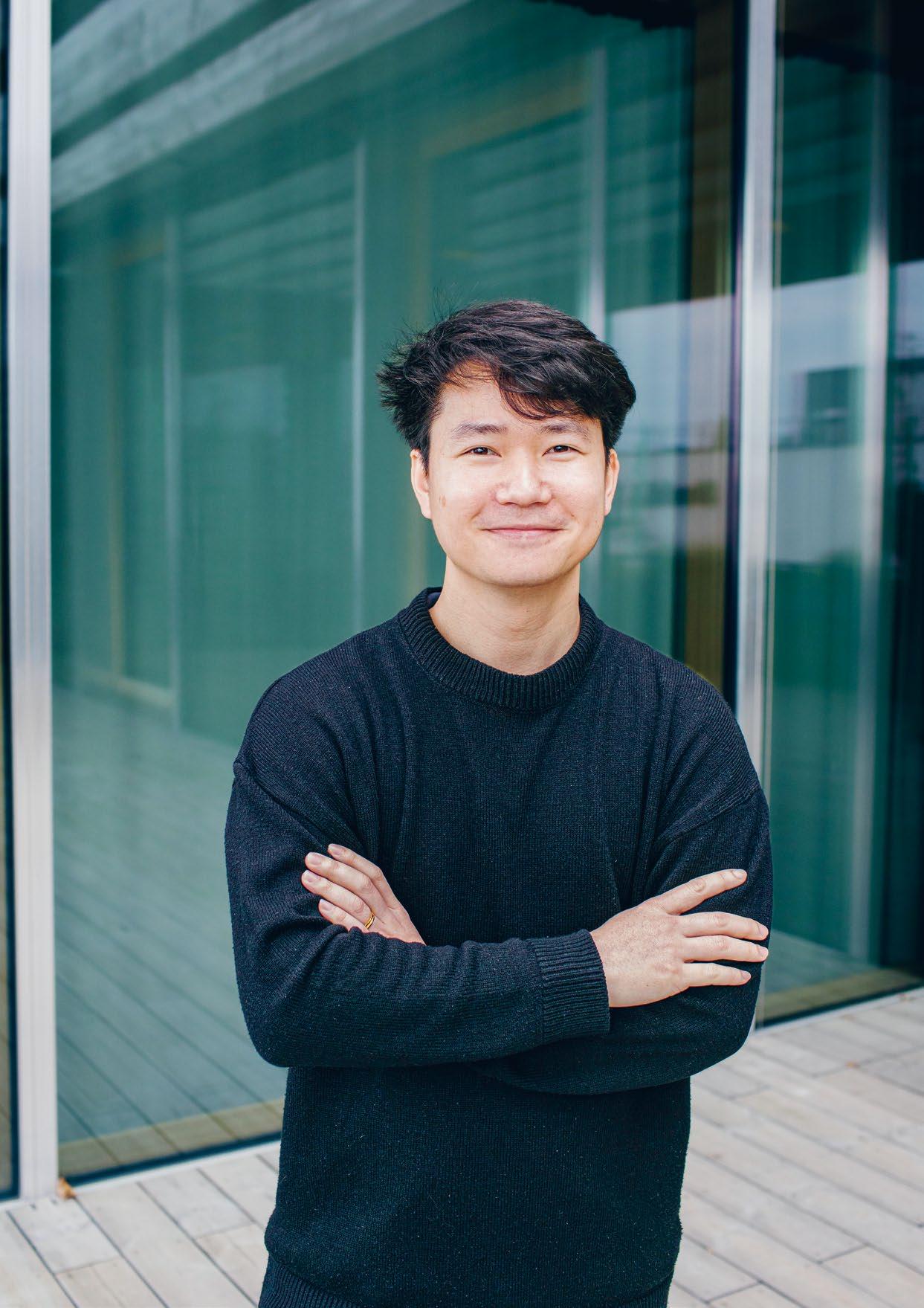
“My goal is to create a meaningful impact on the lives of those affected by liver diseases like bile duct cancer in Lao PDR. I conduct epidemiological studies that reveal the burden of this disease in my community and identify innovative solutions to improve healthcare.”
Anousin Homsana, PhD student in Epidemiology, Swiss TPH
Core Funding
Canton Basel-Landschaft, CH
Canton Basel-Stadt, CH
State Secretariat for Education, Research and Innovation (SERI), CH
University of Basel, CH
Research Funding
Botnar Research Centre for Child Health (BRCCH), CH
EU research grants (e.g. ERC, Horizon, EDCTP), EU National Institutes of Health (NIH), US
Swiss National Science Foundation (SNSF), CH
University of Basel, CH
Foundations
Aeras Global TB Vaccine Foundation, US
Albert-Heim-Stiftung, CH
Anesvad, ES
Baylor College of Medicine Children’s Foundation Lesotho (BCMCFL), LS
Bill & Melinda Gates Foundation (BMGF), US
Biovision, CH
Boehringer Ingelheim Fonds, DE
CDC Foundation, US
Cesti Fondatione Onlus, IT
Clinton Health Access Initiative (CHAI), US
Computer Simulation & Advanced Research Technologies (CSART), AU
Eckenstein-Geigy-Stiftung, CH
Elrha, GB
Else Kröner-Fresenius-Stiftung (EKFS), DE
Fondation Botnar, CH
Fondazione Adiuvare, CH
Fondazione lstituto Nazionale di Genetica Molecolare (INGM), IT
Freiwillige Akademische Gesellschaft (FAG), CH
Global Health Innovative Technology Fund (GHIT), JP
Health Information Traceability Foundation (HIT), CH
Krebsforschung Schweiz, CH
Moritz Straus-Stiftung, CH
Novartis Foundation, CH
R. Geigy Foundation, CH
Sight and Life (SAL), CH
Sint Antonius Foundation, NL
Skat Foundation, CH
Stanley Thomas Johnson Foundation, CH
Swiss Network for International Studies (SNIS), CH
Syngenta Foundation for Sustainable Agriculture (SFSA), CH
Walter Fischli Stiftung, CH
Wellcome Trust, GB
Public Clients Switzerland
Amt für Ausbildungsbeiträge Basel-Stadt, CH
Amt für Umwelt und Energie Basel-Stadt, CH
Bundesamt für Raumentwicklung (ARE), CH
Commission for Research Partnerships with Developing Countries (KFPE), CH
Entwicklungszusammenarbeit des Kantons Basel-Stadt, CH
Federal Department of Defence, Civil Protection and Sport (DDPS), CH
Federal Department of Economic Affairs, Education and Research (EAER), CH
Federal Food Safety and Veterinary Office (FSV), CH
Federal Office of Public Health (FOPH), CH
Federal Office of Sport (FOSPO), CH
Federal Office of the Environment (FOEN), CH
Federal Statistic Office (BFS), CH
Gesundheitsförderung Schweiz, CH
Innosuisse - Swiss Innovation Agency, CH
Kantonsspital Basel-Landschaft, CH
MeteoSchweiz, CH
Nationales Referenzzentrum für Legionellen (NRZL), CH
Swiss Agency for Development and Cooperation (SDC), CH
Swiss Federal Institute of Aquatic Science and Technology (Eawag), CH
Swiss Federal Laboratories for Materials Science and Technology (EMPA), CH
Swiss Pathogen Surveillance Platform (SPSP), CH
Swiss Personalized Health Network (SPHN), CH University Hospital Basel, CH
Public and Public-Private Clients International
African Population and Health Research Center (APHRC), KE
African Society for Laboratory Medicine (ASLM), ET
Agence Française de Développement (AFD), FR
Agence nationale de sécurité sanitaire de l’alimentation, de l’environnement et du travail (ANSES), FR
Asian Development Bank (ADB), PH
Association of Churchbased Development NGOs (ACDEP), GH
Bundesamt für Auswärtige Angelegenheiten (BfAA), CH
Canadian Association for Global Health (CAGH), CA
Centers for Disease Control and Prevention (CDC), US
Centre de Support en Santé Internationale (CSSI), TD
Deutsche Gesellschaft für Internationale Zusammenarbeit (GIZ), DE Direction des Services Vétérinaires (DSV), FR
Drugs for Neglected Diseases initiative (DNDi), CH
Elgo Dimitra - Ellinikos Georgikos Organismos, GR Epicentre, FR
European Institute of Public Health Policy (EIPHP), UA
Food and Drug Administration (FDA), US Foundation for Innovative New Diagnostics (FIND), CH
Gavi, the Vaccine Alliance, CH
German Institute for Medical Mission (DIFAM), DE Global Fund to Fight AIDS, Tuberculosis and Malaria, CH
Grand Challenges Canada, CA
Health and Environment Alliance (HEAL), BE
Helse Nord Tuberculosis Initiative Malawi (HNTI), NO
Human Sciences Research Council (HSRC), ZA
Innovations for Poverty Action (IPA), US Institut de Recherche pour le Développement (IRD), FR Institut de Recherches en Elevage pour le Développement (IRED), TD Institut National d’Hygiène Publique (INHP), CI Institut national de l'environnement industriel et des risques (Ineris), FR Instituto Nacional de Saúde (INS), MZ
International Committee of the Red Cross (ICRC), CH
ISGlobal, ES
Kreditanstalt für Wiederaufbau (KfW), DE Medical Care Development International (MCDI), US
Medicines for Malaria Venture (MMV), CH
Muséum national d’Histoire naturelle, FR
National Center of Tuberculosis and Lung Diseases (NCTLD), GE
National Public Health Center (Nemzeti Népegészségügyi Központ), HU
Norwegian Agency of Development Cooperation (Norad), NO
Nutrition International, CA
Organisation de Coordination pour la lutte contre les endémies en Afrique Centrale, CM
Right to Care Zambia (RTCZ), ZM
Schistosomiasis Control Initiative Foundation (SCI), GB
Swiss Red Cross (SRC), CH
The International Society for Research in Human Milk and Lactation (ISRHML), US tropEd Network for Education in International Health, DE
Unitaid, CH
United Kingdom Department for International Development (DFID), GB
United Nations Children Fund International (Unicef), US
United Nations Development Programme (UNDP), US
United Nations Population Fund (UNFPA), US
United States Agency for International Development (USAID), US
West African Health Organisation (WAHO)
World Bank, US
World Health Organization (WHO), CH
World Organisation for Animal Health (WOAH), FR
Private Clients and Non-Profit Organisations
AEDES, BE
Anglo American Services (UK) Ltd., GB
Astellas Pharma AG, CH
Bacoba AG, CH
BASF SE, DE
Bayer AG, CH
BioInitials, CH
Bristol Myers Squibb, US
Cardno Emerging Markets East Africa Ltd. (CEM), KE
Conseil Santé, FR
Effectum Medical AG, CH
Fields at Work GmbH, CH
Game Solutions Lab, NL
GFA Consulting Group GmbH, DE
Grolimund + Partner AG, CH
Health Effects Institute (HEI), US
Hemex AG, BS
Ideas for Change, ES
Insuco, UK
International Association for Maternal and Neonatal Health (IAMANEH), CH
Life4me+, CH
Lygature, NL
Martin Systems GmbH, DE
Médecins Sans Frontières (MSF), CH
Merck, DE
NED-TECH AG, CH
Novartis Pharma AG, CH
OmicScouts, DE
OptiMedis AG, DE
Oryx Expertise, FR
Pact, US
PATH, US
Privatklinik Meiringen, CH
RANAS Ltd., CH
Rotarians Against Malaria (RAM), PG
Science for Change, ES
Seboche Mission Hospital, LS
SKAN, CH
SolDevelo, PL
SolidarMed, CH
Specs Compound Handling B.V., NL
Swiss Excellence Forum, CH
Syngenta, CH
Terre des hommes, CH
Universitätsklinikum Bonn (UKB), DE
VisibleSolutions AG, CH
Wits Health Consortium (Pty) Limited (WHC), ZA
Academic Partners
Academic Medical Center (Academisch Medisch Centrum), NL
Addis Ababa University (AAU), ET
Agricultural University of Athens, GR
Armauer Hansen Research Institute (AHRI), ET Berner Fachhochschule (BFH), CH
Bernhard-Nocht-Institut für Tropenmedizin, DE Boston University, US
Brown University, US
Centre hospitalier régional et universitaire de Besançon (CHRU), FR
Centre national de la recherche scientifique (CNRS), FR
Centre Suisse d’Electronique et de Microtechnique (CSEM), CH
Centre Suisse de Recherches Scientifiques en Côte d’Ivoire (CSRS), CI
Charité – Universitätsmedizin Berlin, DE
College of Art and Sciences, Xavier University, Cincinnati, US
Consiglio Nazionale delle Ricerche, IT
Cyprus University of Technology, CY
École Polytechnique Fédérale de Lausanne (EPFL), CH
Eindhoven University of Technology, NL
Eucor – The European Campus, CH, DE, FR
Forschungszentrum Borstel, Leibniz Lungenzentrum (FZB), DE
Geneva University Hospitals (HUG), CH
Ghent University, BE
Harvard T.H. Chan School of Public Health, US
Helmholtz Centre for Infection Research, DE
Ifakara Health Institute (IHI), TZ
Innovative Vector Control Consortium (IVCC), GB
Inselspital Bern, CH
Institut Mines-Télécom (IMT), FR
Institut Pasteur, FR
Institute of Social and Preventive Medicine (ISPM), Bern, CJ
Institute of Tropical Medicine Antwerp (ITM), BE
Instituto de Higiene e Medicina Tropical Universidade Nova de Lisboa (IHMT), PT Instituto Nacional de Saúde (INS), MZ
Institutul de Ftiziopneumologie “Chiril Draganiuc”, MD
Institutul de Pneumoftiziologie “Marius Nasta” (IPMN), RO
James Cook University (JCU), AU
KEMRI - Wellcome Trust Research Programme, KE
Kenya Medical Research Institute (KEMRI), KE
Lao Tropical and Public Health Institute (Lao TPHI), LA
Lausanne University Hospital (CHUV), CH
Liverpool School of Tropical Medicine (LSTM), GB
London School of Hygiene & Tropical Medicine (LSHTM), GB
Lucerne University of Applied Sciences and Arts (HSLU), CH
Ludwig Maximilian University of Munich (LMU), DE
Makerere University, UG
Manhiça Health Research Centre (CISM), MZ
Massachusetts General Hospital, US
Moi University, KE
MRC/Wits Agincourt Field Office, ZA
National Institute for Medical Research (NIMR), TZ
National Institute for Research in Tuberculosis (ICMR), IN
National Institute of Health (NIH), US
Nofer Institute of Occupational Medicine, PL
Norwegian University of Life Sciences (NMBU), NO
Obafemi Awolowo University, NG
Ospedale San Raffaele (SRL), IT
Palestine Polytechnic University, PS
Papua New Guinea Institute of Medical Research (PNG IMR), PG
Paul Scherrer Institute, CH
Penta Child Health Research, IT
PNG National Research Institute, PG
Public Health Laboratory Ivo de Carneri (PHL-IdC), TZ
Qom University of Medical Sciences, IR
Radboud University Nijmegen, NL
Rwanda Biomedical Centre (RBC)
Sapienza University of Rome, IT
School of Social Work Fribourg (HETS-FR), CH
South African Medical Research Council, ZA
Swiss Association for Quality (SAQ), CH
Swiss Federal Institute of Technology in Zurich (ETHZ), CH
Swiss Institute of Bioinformatics (SIB), CH
Swiss School of Public Health (SSPH+), CH
swissuniversities Development and Cooperation Network (SUDAC), CH
Technische Universität München (TUM), DE
Temple University, US
The Aurum Institute, ZA
The George Institute for Global Health India, IN
Umeå University, SE
Unisanté, CH
Universidad Peruana Cayetano Heredia (UPCH), PE
Universität St. Gallen, CH
Universitäts-Kinderspital beider Basel (UKBB), CH
Université de Genève, CH
Université de Lausanne, CH
Université de Neuchâtel, CH
Université des Sciences, des Techniques et des Technologies de Bamako (USTTB), ML
Université Félix Houphouët-Boigny (UFHB), CI
University of Antwerp, BE
University of Applied Sciences and Arts Northwest Switzerland (FHNW), CH
University of Applied Sciences and Arts of Southern Switzerland (SUPSI), CH
University of Applied Sciences and Arts Western Switzerland (HES-SO), CH
University of Basel, CH
University of Bergen (UiB), NO
University of Bern, CH
University of Bologna, IT
University of Buea, CM
University of Calabar, NG
University of California San Francisco (UCSF), US
University of Cambridge, GB
University of Cape Town, ZAUniversity of California, San Francisco (UCSF), US
University of Dundee, GB
University of Ghana, GH
University of Ghent, BE
University of Gothenburg, SE
University of Groningen (RUG), NL
University of Health and Allied Sciences (UHAS), GH
University of Heidelberg, DE
University of Ibadan (UI)
University of KwaZulu-Natal
University of Lugano, CH
University of Luzern, CH
University of Maiduguri, NG
University of Malawi, MW
University of Maryland, US
University of Montpellier, FR
University of Nebraska, US
University of Oxford, UK
University of Pécs, HU
University of Sao Paulo (USP), BR
University of Strasbourg, FR
University of the Witwatersrand, ZA
University of Turin, IT
University of Utrecht, NL
University of Vienna, AU
University of Warwick, GB
University of Washington (UW), US
University of Zurich, CH
Weizmann Institute of Science, IL Yale University, US
*The list reflects all Swiss TPH partners and funders that are within our staffmanaged project database.

Concept and edits: Layla Hasler
Additional contributions: Sabina Beatrice-Matter, Myrta Brunner, Silija Körkel, Danielle Powell, Jürg Utzinger, Department Heads and Swiss TPH staff members
Layout and design: Neeser & Müller
Pictures: Adobe stock photos, Olivier Brandenberg, Salomon Djekorgee Dainyoo/ Fairpicture/ STJF, DNDi, Christian Flierl, Christian Heuss, ICRC, Claire Jeantet –Fabrice Caterini/Inediz, Alice Kayibanda, Matthis Kleeb, Justin Makangara/Fairpicture, Elizabeth Nyakurungu/Bloomberg Philanthropies
Data for Health Initiative, Joachim Pelikan, Danielle Powell, Thomas Schuppisser, 123rf and Swiss TPH staff
Cover photo: Olivier Brandenberg
Printing: Gremper AG
Copyright: Swiss TPH, 2023